Florida Documents
Quitclaim Deed
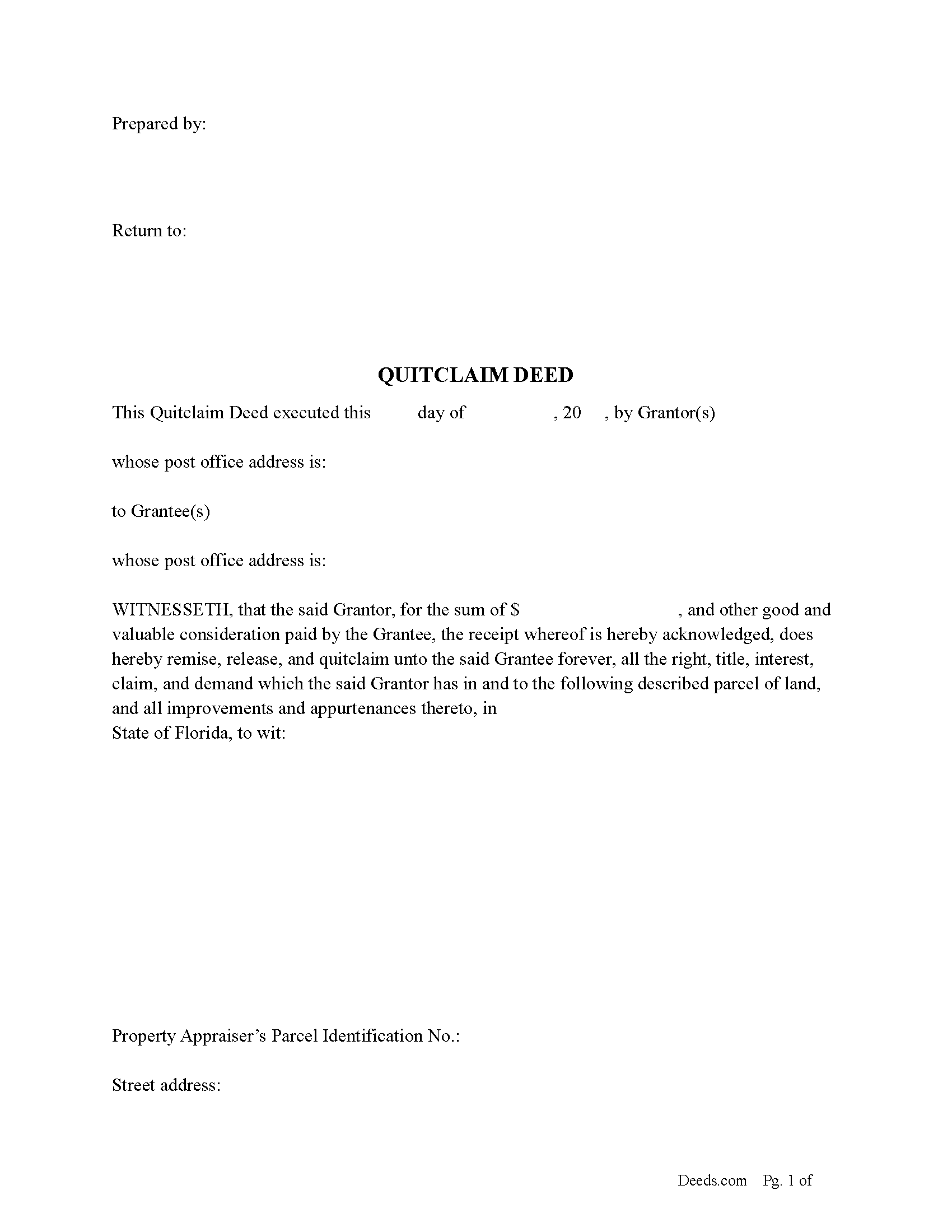
Florida statutory requirements for quit claim deed form content:
F. S. 689.01 presents the basic rules for conveying real property in Florida. Although quitclaim deeds are not specifically defined in the Florida Statutes, the correct language, modifications, and content work together to create an instrument that legally transfer ownership of land.
All quitclaim deeds must be in writing and be signed by the grantor in the presence of two witnesses. In addition to these details, F. S. 689.02 presents the form for a warranty deed. It includes requirements for the date of conveyance; the names, addresses, and counties of both parties (grantor and grantee); the amount of consideration (usually money); and a complete legal description of the property. The statutory form also requests the property appraiser's parcel ID, which should be included if possible, and the grantee's social security number, which may be omitted on documents submitted for recordation and entry into the public record. This basic form also includes warranty covenants, however, which must be deleted and/or changed where appropriate because quit claim deeds do not contain any warranty protection for the grantee.... More Information about the Florida Quitclaim Deed
Gift Deed
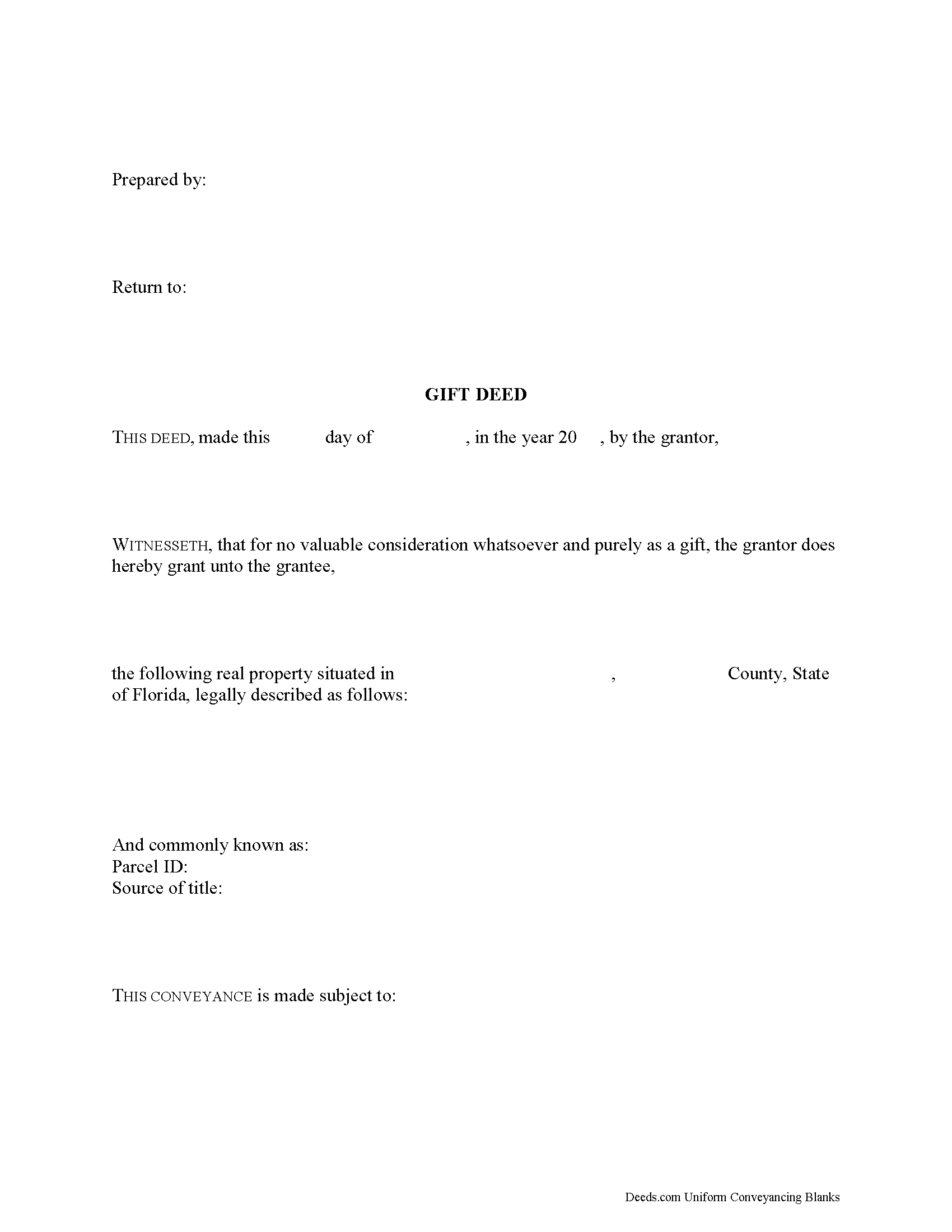
Gift deeds convey title to real property from one party to another with no exchange of consideration, monetary or otherwise. Often used to transfer property between family members or to gift property as a charitable act or donation, these conveyances occur during the grantor's lifetime. Gift deeds must contain language that explicitly states that no consideration is expected or required. Ambiguous language, or references to any type of consideration, can make the gift deed contestable in court.
A lawful gift deed includes the grantor's full name and marital status, as well as the grantee's full name, marital status, vesting information, and mailing address. Vesting describes how the grantee holds title to the property. Generally, real property is owned in either sole ownership or co-ownership. For Florida residential property, the primary methods for holding title are tenancy in common, joint tenancy, and tenancy by the entirety. An estate conveyed to two or more people is presumed to be a tenancy in common, unless otherwise specified (Fla. Stat. 689.15).
As with any conveyance of realty, a gift deed requires a complete legal description of the parcel. Recite the source of ... More Information about the Florida Gift Deed
Enhanced Life Estate Deed Quitclaim Ladybird Deed
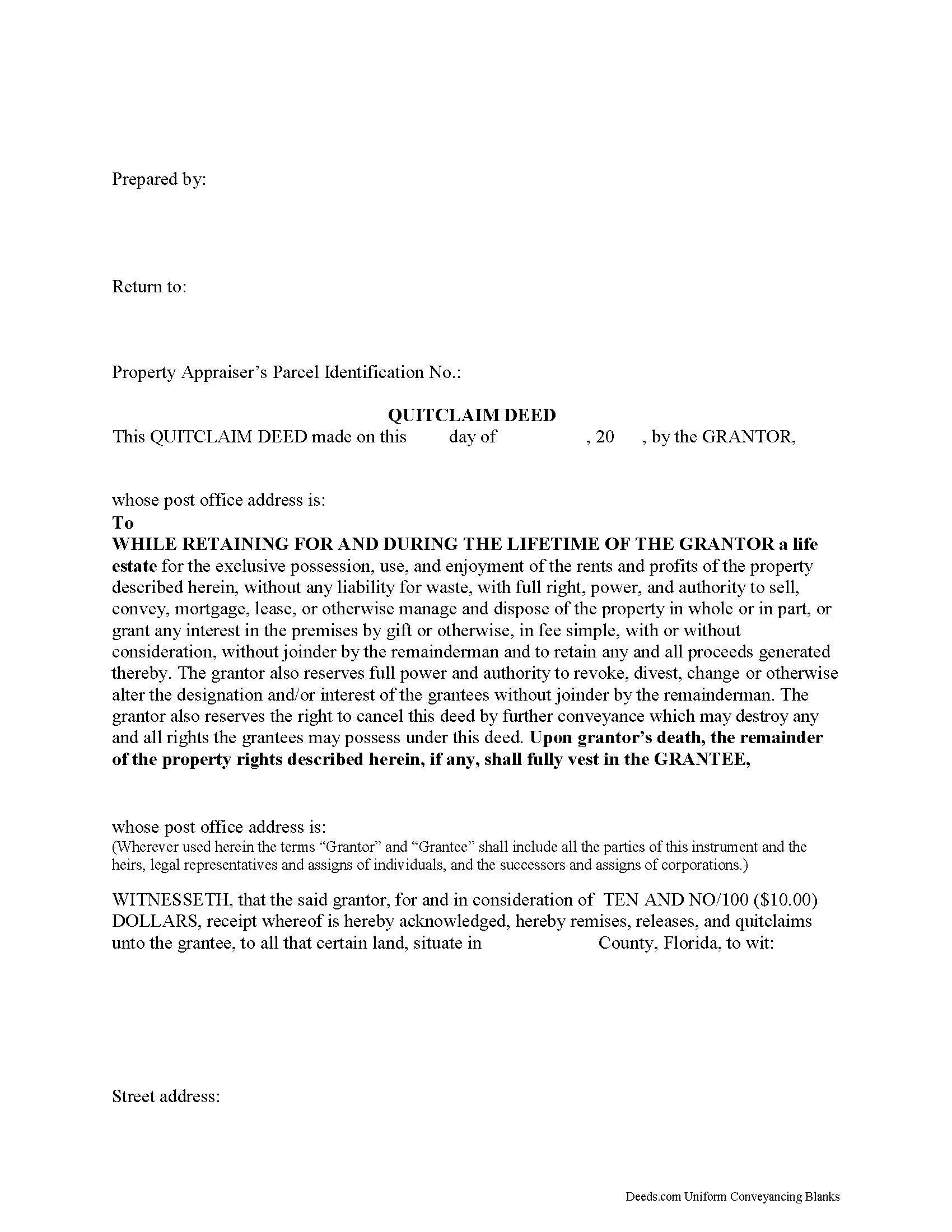
This enhanced life estate deed is a document that transfers ownership of real property, while reserving full access to the property for the duration of the grantor's life. It allows the original owner (grantor) to remain on the premises with the rights to use or dispose of it at will, with no penalty for waste. The grantor may even reconvey the property to someone else without the grantee's knowledge. The grantee under the deed reserving a life estate for the grantor is not entitled to possession of the property until the grantor dies.
When the enhanced life estate is applied to a quitclaim deed, the transfer of ownership is completed upon the death of the life tenant, but there are no warranties of title.
(This Package includes form, guidelines, and completed example)... More Information about the Florida Enhanced Life Estate Deed Quitclaim Ladybird Deed
Warranty Deed
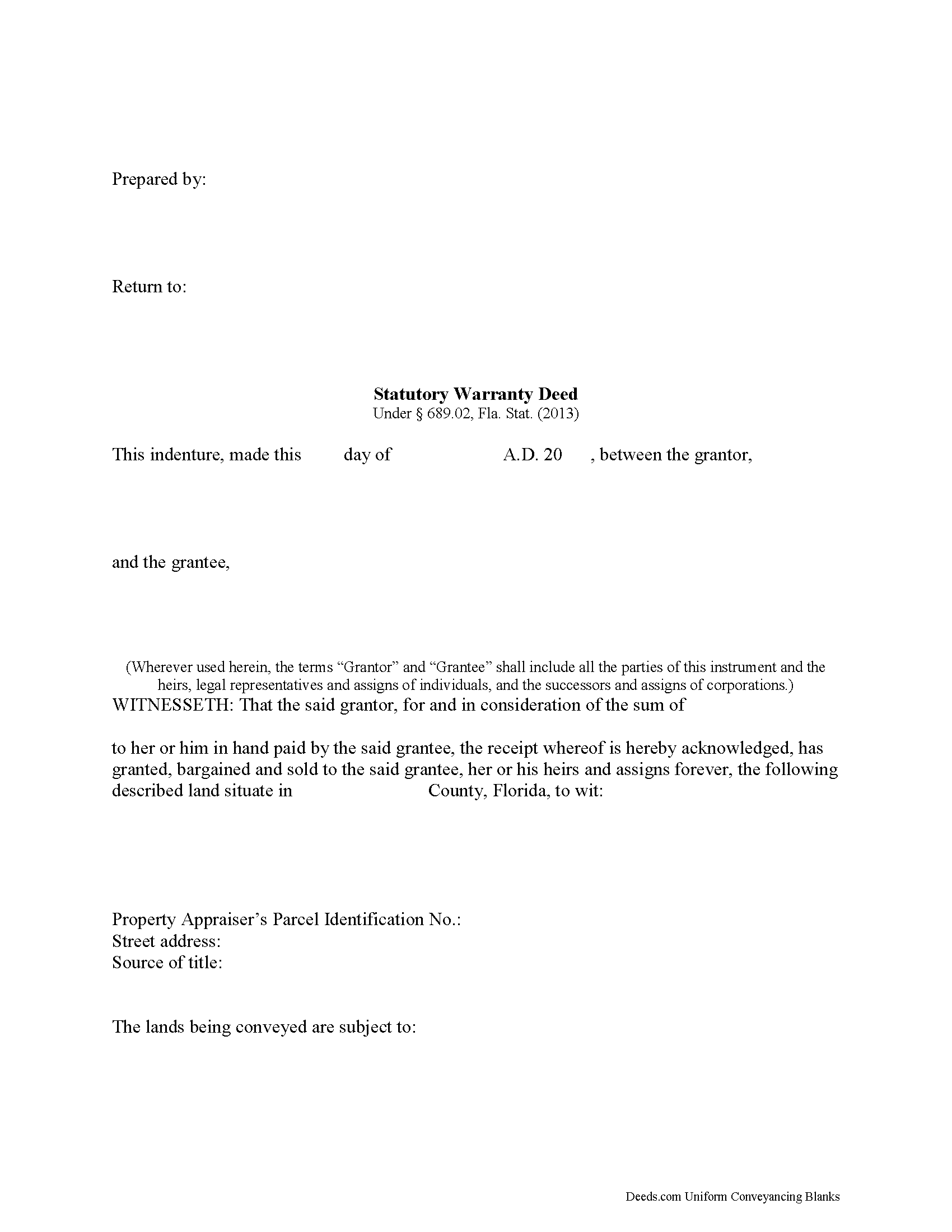
Warranty deeds in Florida are used to create, grant, transfer, or release an estate or interest of freehold. Any conveyance of real estate in Florida is required to be in writing and signed by the grantor (or by the grantor's lawfully authorized agent) in the presence of two subscribing witnesses (689.01). A statutory form for a warranty deed is provided in section 689.02 of the Florida Statutes. The grantor to a warranty deed offers a covenant of full warranty to the title of the land being conveyed, and will defend the same against the lawful claims of all persons (689.02). The warranty deed is used for many real estate transactions in Florida. It is sometimes referred to as a general warranty deed.
In order for recording to take place, the execution of a warranty deed must be acknowledged by the party executing it, proved by a subscribing witness, or legalized or authenticated by a civil-law notary or notary public who affixes his or her official seal before the officers in the manner provided by law (695.03). The grantor's signature requires two witnesses; however, the notary public can be one of the witnesses, but the notary must then sign the document twice: both as a nota... More Information about the Florida Warranty Deed
Enhanced Life Estate Deed Ladybird Warranty Deed
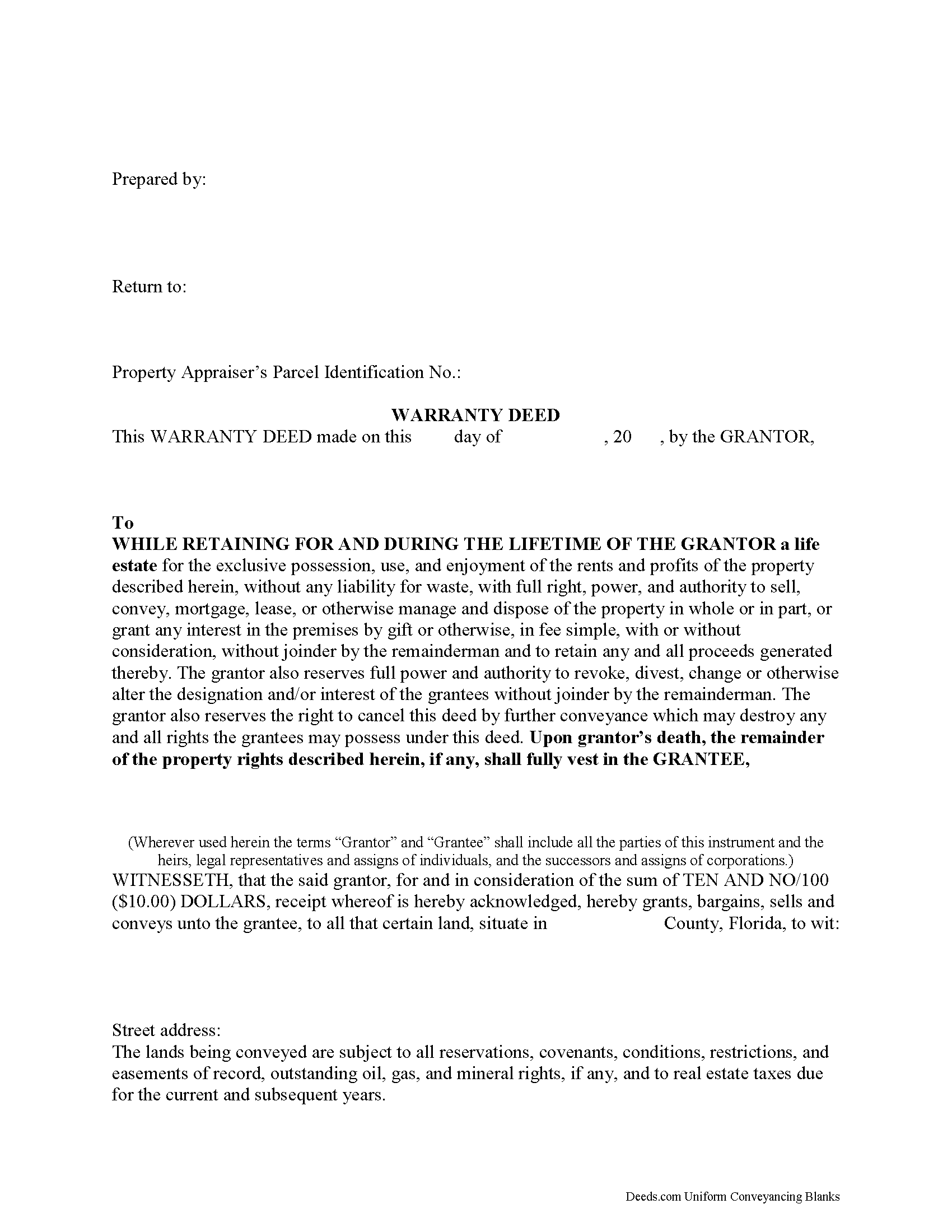
This enhanced life estate deed is a document that transfers ownership of real property, while reserving full access to the property for the duration of the grantor's life. It allows the original owner (grantor) to remain on the premises with the rights to use or dispose of it at will, with no penalty for waste. The grantor may even reconvey the property to someone else without the grantee's knowledge. The grantee under the deed reserving a life estate for the grantor is not entitled to possession of the property until the grantor dies.
When the enhanced life estate is applied to a warranty deed, the transfer of ownership is completed upon the death of the life tenant, along with full warranties of title.
(This Deed Package includes form, guidelines, and completed example)... More Information about the Florida Enhanced Life Estate Deed Ladybird Warranty Deed
Special Warranty Deed
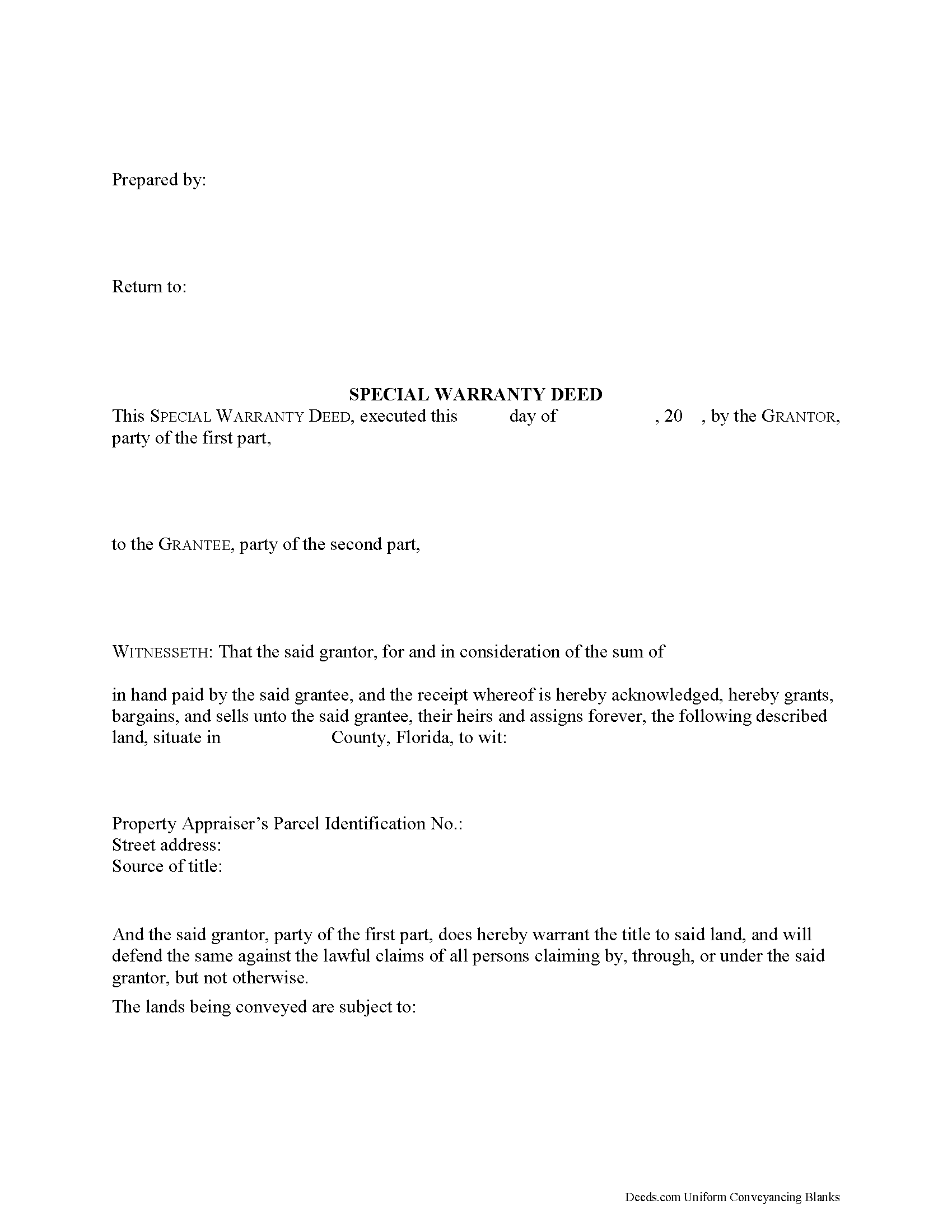
A conveyance of real estate in Florida must meet the statutory requirements as set forth in the Florida Revised Code.
Special warranty deeds can be used to convey title to real estate in Florida. This type of deed limits the general covenants of warranty by covenanting only against defects of title arising by, through, or under the grantor. Other covenants, such as the right to convey and a covenant against future encumbrances may be included in the deed.
The execution of a special warranty deed must be acknowledged by the party executing it, proved by a subscribing witness, or legalized or authenticated by a civil-law notary public who affixes his or her official seal in the manner provided by law (695.03). Two witnesses are required for the grantor’s signature; however the notary public may act as a witness, and should sign the deed both as a notary and as a witness. A special warranty deed can be acknowledged in Florida or in another state by any of the officers listed in 695.03 of the Florida Revised Statutes. A certificate of acknowledgement or proof, under the seal of the court or officer taking acknowledgements, should be attached to the deed presented for recor... More Information about the Florida Special Warranty Deed
Grant Deed
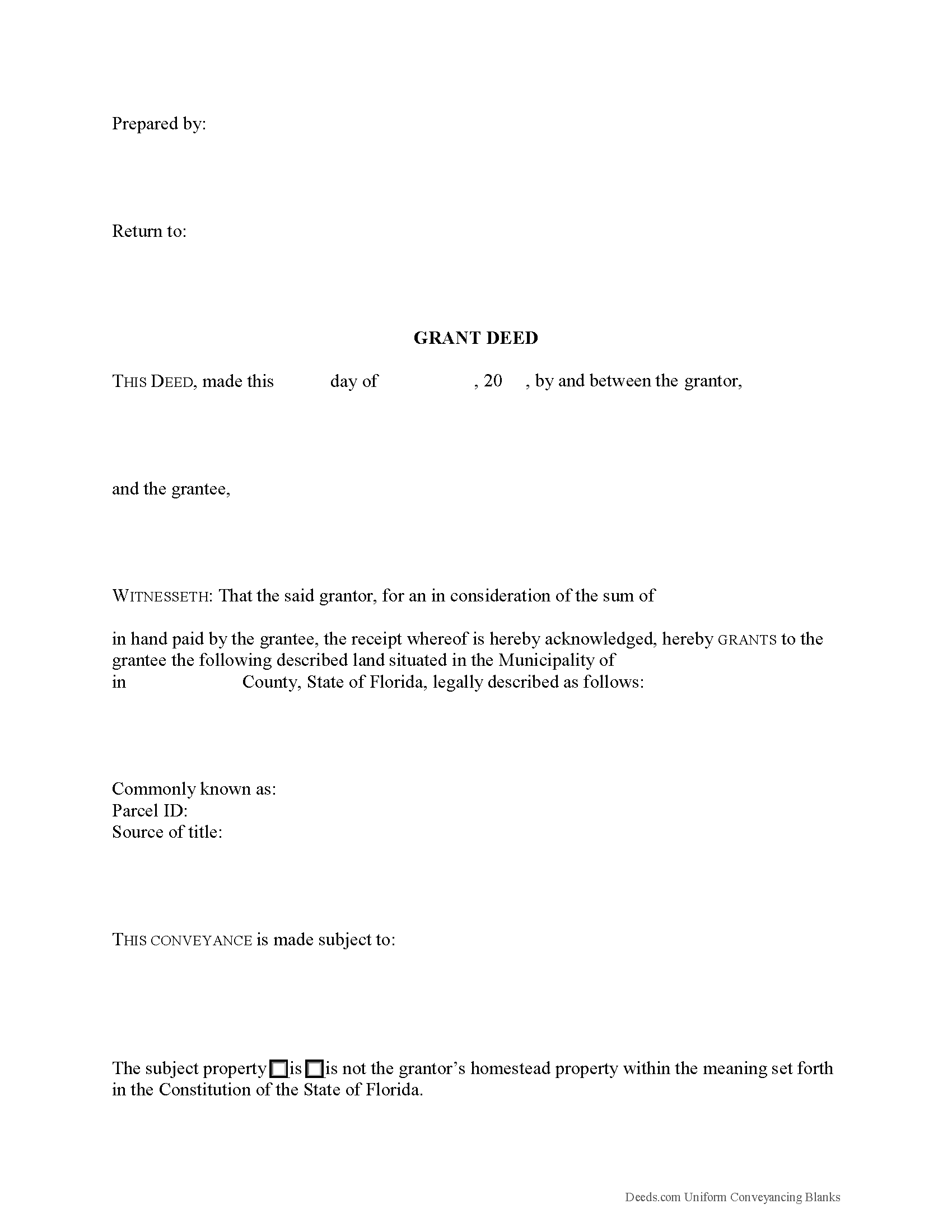
A grant deed in Florida can be used to transfer ownership in property from a grantor to a grantee. An estate or interest of freehold, or an estate for a term of more than one year is created, made, granted, transferred, or released by a deed in writing that is signed by the grantor in the presence of two subscribing witnesses (689.01). The grant deed is not mentioned by name in the Florida Revised Statutes, but it can be used in this state to transfer ownership from one living person to another. In a grant deed, the grantor promises that the title has not been previously transferred to anyone other than the grantee and that there are not any encumbrances on the property, other than those that may be stated in the deed. The grant deed does not offer as much protection as a warranty deed.
To entitle a grant deed to be recorded, it must be signed by the grantor, and the execution of the deed must be acknowledged by the party executing it, and proved by two subscribing witnesses or legalized or authenticated by a civil law notary or notary public who affixes his or her official seal, before the officers and in the form or manner dictated by statute. The notary public may serve as ... More Information about the Florida Grant Deed
Correction Deed
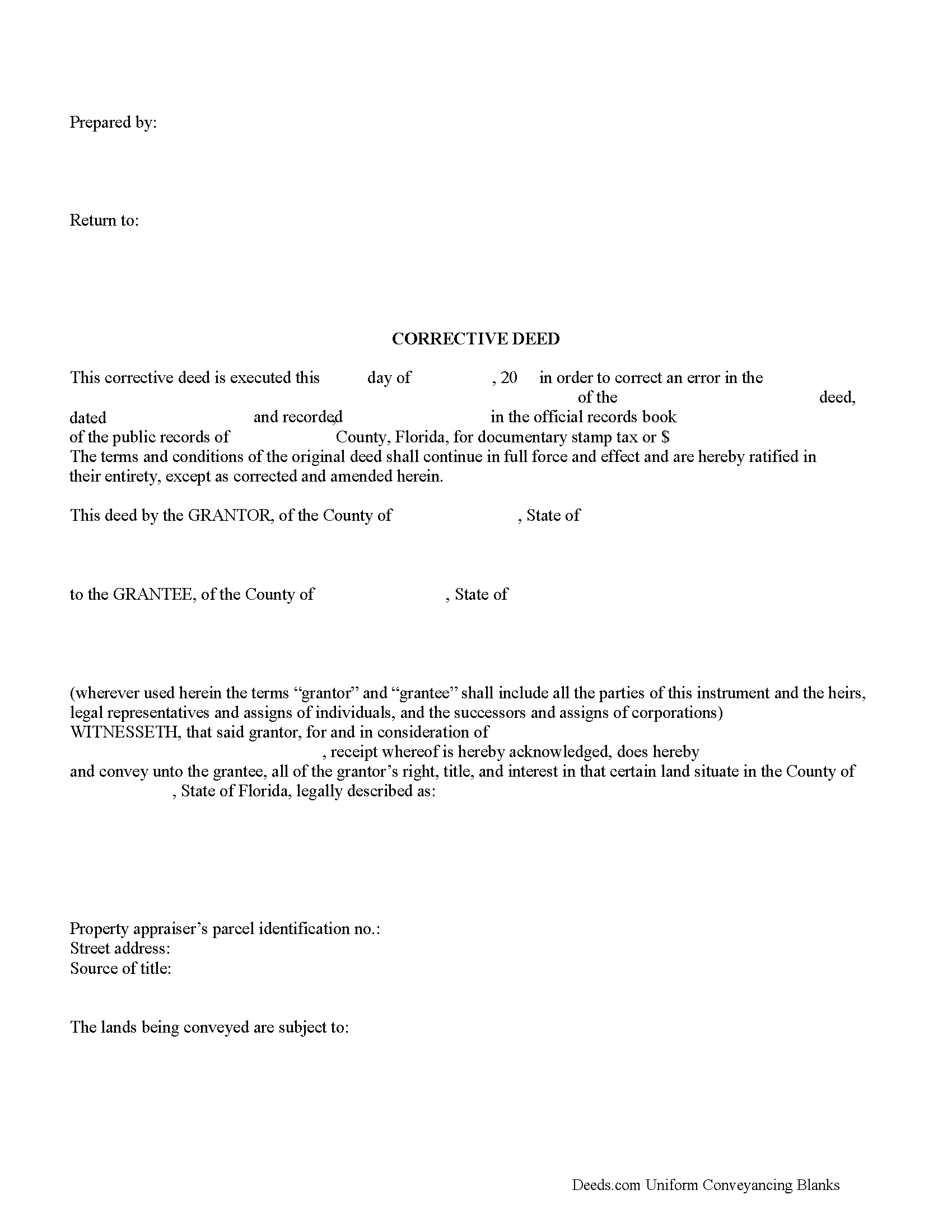
Correct common errors in a deed, such as typographical mistakes or omissions in various sections of the original deed, by using a corrective deed, which must be signed by the grantor and witnesses and re-acknowledged.
The Florida Bar Association points out that the lack of a date or a wrong date does not invalidate a deed according to Florida Uniform Title Standard 3.6. They recommend against correcting deeds that are valid in spite of an error. When title has not passed to the grantee due to an error, however, use of a corrective instrument can be crucial. This would be in the case of an insufficient legal description, a lack of witnesses, a failure to obtain joinder of a grantor's spouse on a deed to homestead property, or if the deed lacks proper acknowledgement so that its recording does not impart proper notice. Five years after recording, however, a deed is presumed to be valid even if there was a defective acknowledgement or lack of witnesses (F.S. 95.231).
A corrective deed is not capable of divesting an unintended grantee, which can be remedied by the new grantor passing title to himself and another grantee. A corrective deed is also incapable of re-vesting portions... More Information about the Florida Correction Deed
Easement Deed
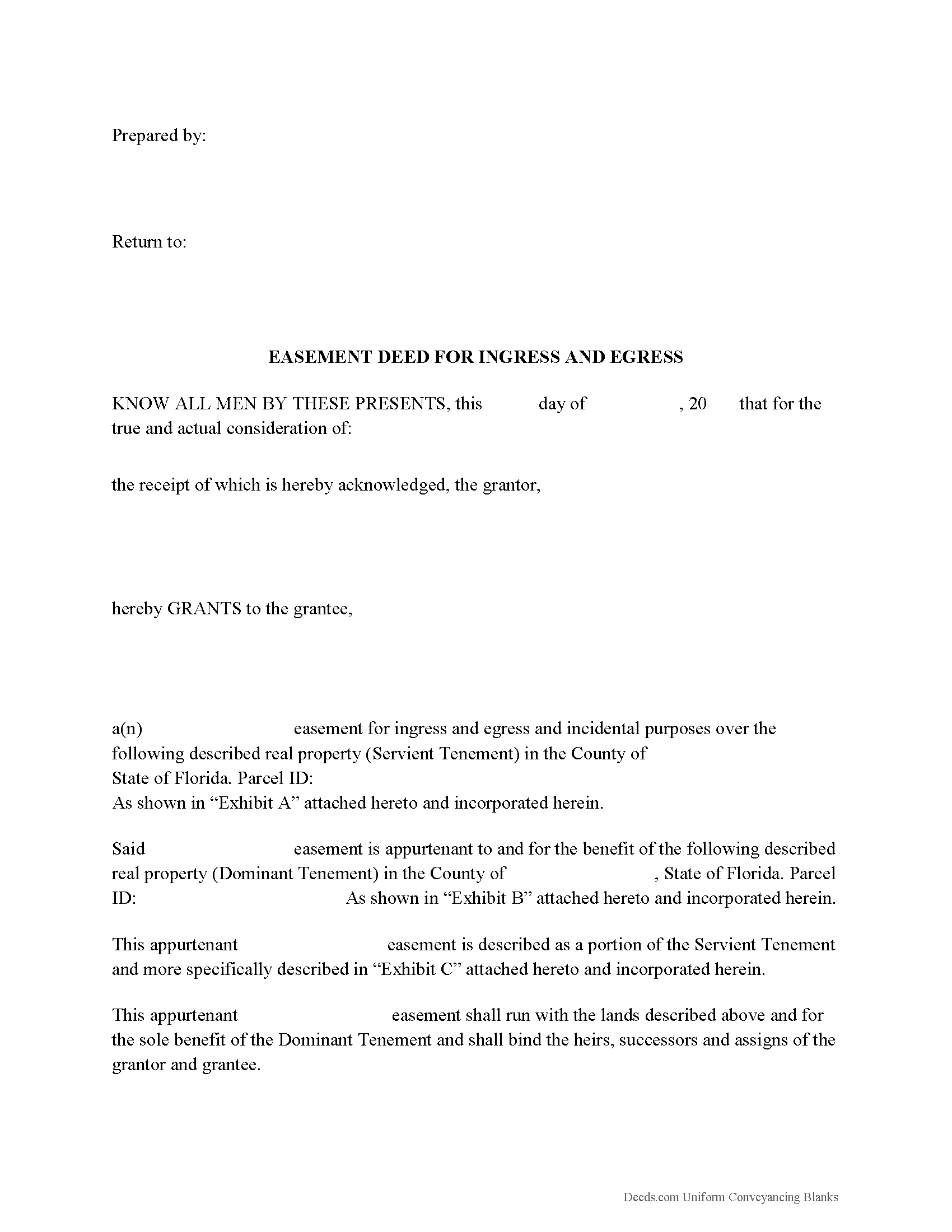
An easement is a non-possessory right to use another person's land for a specific purpose. This right is granted by an easement deed. In Florida, easement deeds can be in many different forms, such as an implied grant of way of necessity, a statutory way of necessity exclusive of common law right, a conservation easement, or a solar easement.
An implied grant exists when a person has previously granted lands to which there is no accessible right-of-way, except over his or her land. In these instances, it is presumed that a right-of-way has been granted or reserved. A statutory way of necessity exclusive of common law right exists when any land, which is being used for dwellings or is desired to be used as a dwelling, or for agricultural or timber raising or cutting purposes is shut off or hemmed in by lands, fencing, or other improvements by other persons so that no practicable route of egress or ingress is available from the nearest public road from which the landlocked landowner has vested easement rights (704.01).
A conservation easement can also be created in Florida and can be held by a governmental agency or charitable organization whose purposes include protecting the ... More Information about the Florida Easement Deed
Termination, Cancellation of Easement / Right of Way
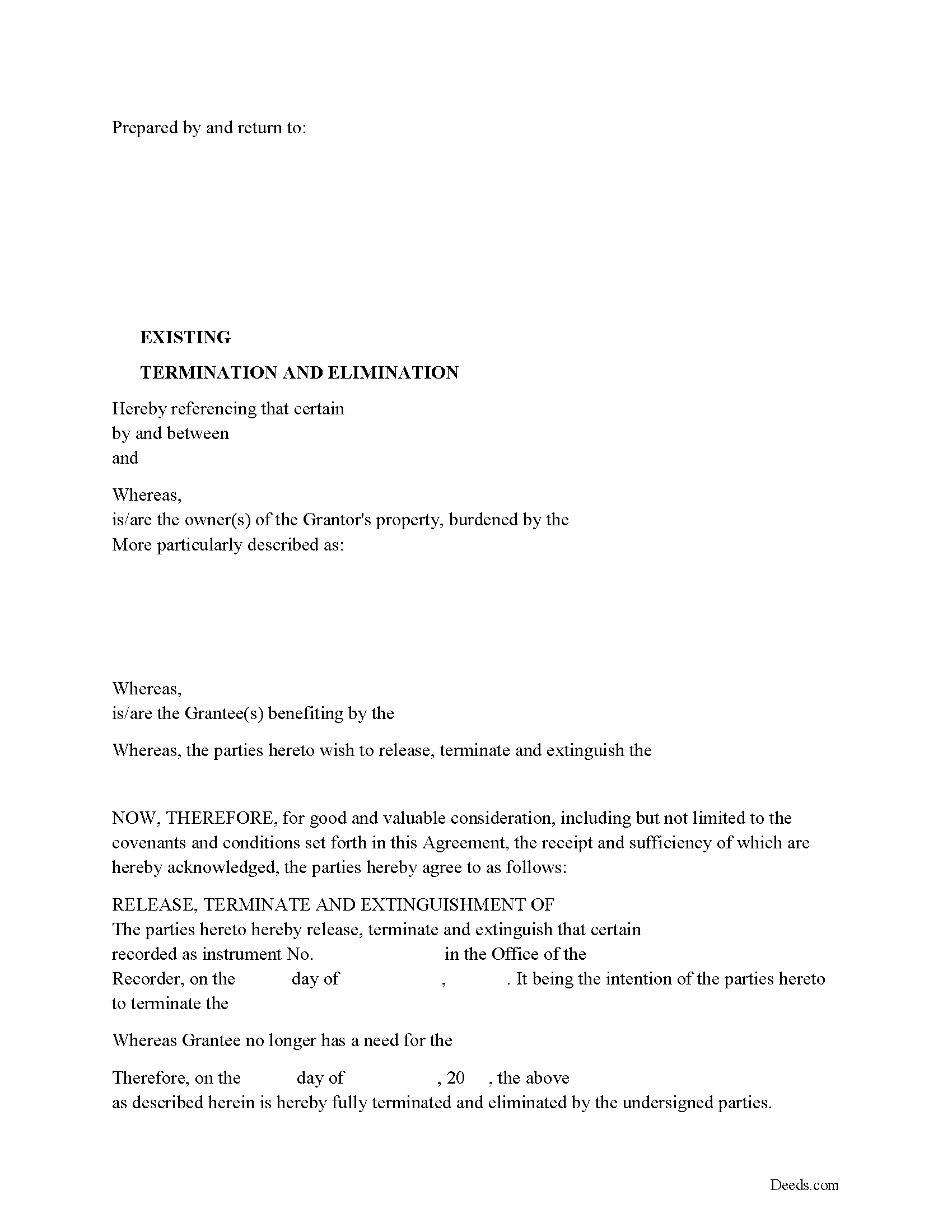
Use this form to release, terminate, extinguish a previously recorded document that involves access to and from a property.
Documents such as:
1. Easement Deeds or Agreements (An easement is a non-possessory interest in land, granting the right to use someone else's property for a specific purpose, like a driveway or utility line)
2. Access Roads
3. Right of Ways
4. Utility Easements (Power, Gas, Water, Sewer, Etc.)
5. Drainage Easements
This document allows the owner of the land, burdened by the access and the party that benefits from the access, to sign an agreement releasing the property from such access, ... More Information about the Florida Termination, Cancellation of Easement / Right of Way
Trustees Deed
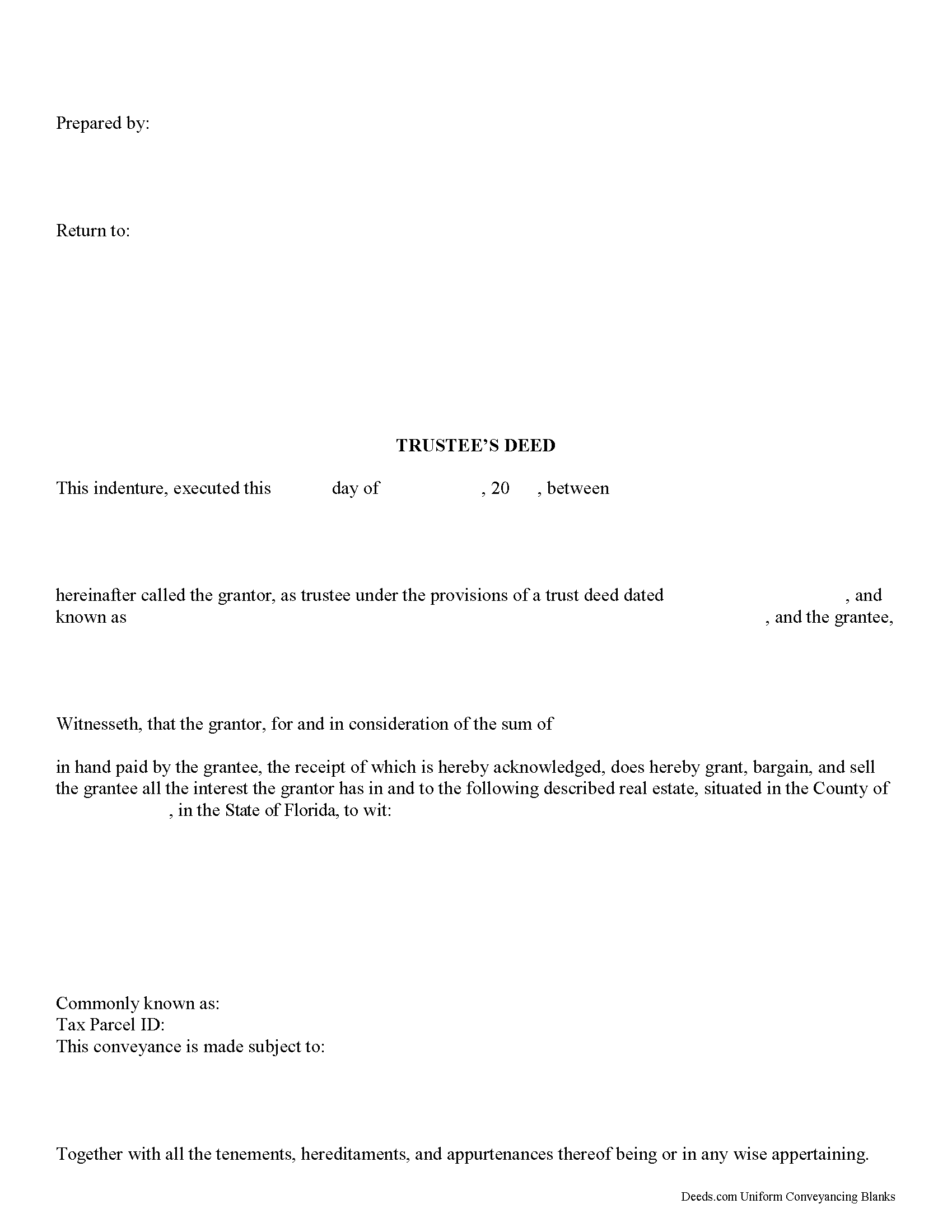
Trustees use this form for a trustee to transfer real estate out of a Florida living trust or land trust, or in a foreclosure situation. It meets the same content requirements as a standard warranty or quitclaim deed, but also includes relevant details about the trust, and any other information needed for the transfer.
This type of conveyance is named for the person using the form -- the trustee -- who stands in for the beneficiary of the trust and holds title to the property. Trustees act according to the terms of the trust, and under the direction of the trustor, also called the settlor, grantor, or donor (the person or entity who transferred the assets into the trust). In some situations, the trustor may also serve as the trustee. Note that when signing trustee's deeds, the trustee must identify him/herself as trustee and include the full name of the trust.
After the trustee executes the form, record it in the real property records of the county where the land is situated to provide public notice of the change in ownership.
(Florida Trustees Deed Package includes form, guidelines, and completed example)... More Information about the Florida Trustees Deed
Disclaimer of Interest
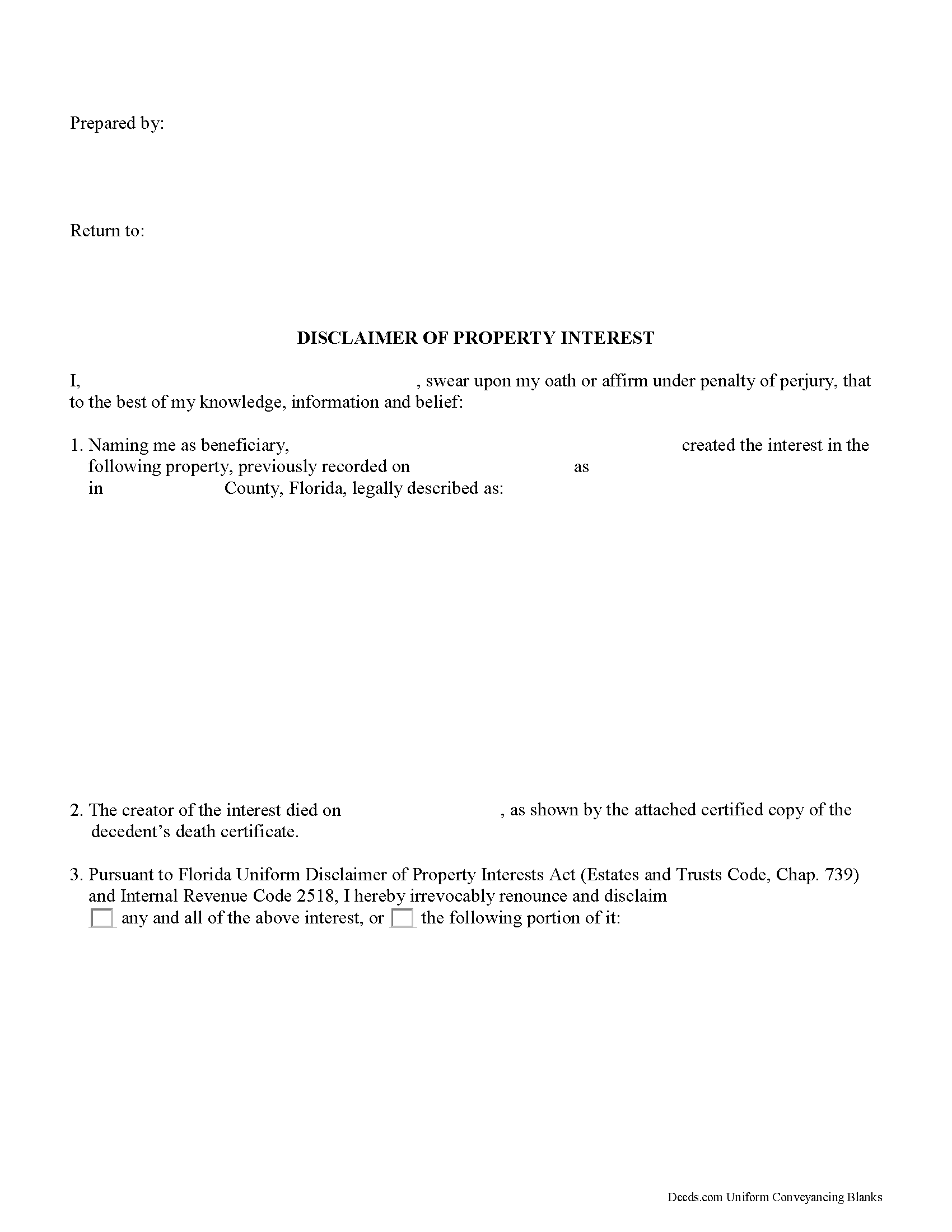
A beneficiary of an interest in property in Florida can disclaim all or part of a bequeathed interest in or power over property according to the Florida Uniform Disclaimer of Property Interests Act (Estates and Trusts Code, Chapter 739). This document must be in writing, declared a disclaimer, signed by the beneficiary or a legally authorized representative, and witnessed and acknowledged like a deed (739.104).
The disclaimant must record the disclaimer with the clerk of the court in the county where the property is located, as well as deliver it to the legal representative of the decedent, the fiduciary or administrator of the estate, or to the person to whom title to the property will pass (739.601).
Once effective, the disclaimer is irrevocable and the disclaimed interest "passes according to any provision in the instrument creating the interest providing explicitly for the disposition of the interest" (739.201). Be sure to consult an attorney when in doubt about the drawbacks and benefits of disclaiming inherited property.
(Florida Disclaimer of Interest Package includes form, guidelines, and completed example)... More Information about the Florida Disclaimer of Interest
Affidavit of Death Certificate
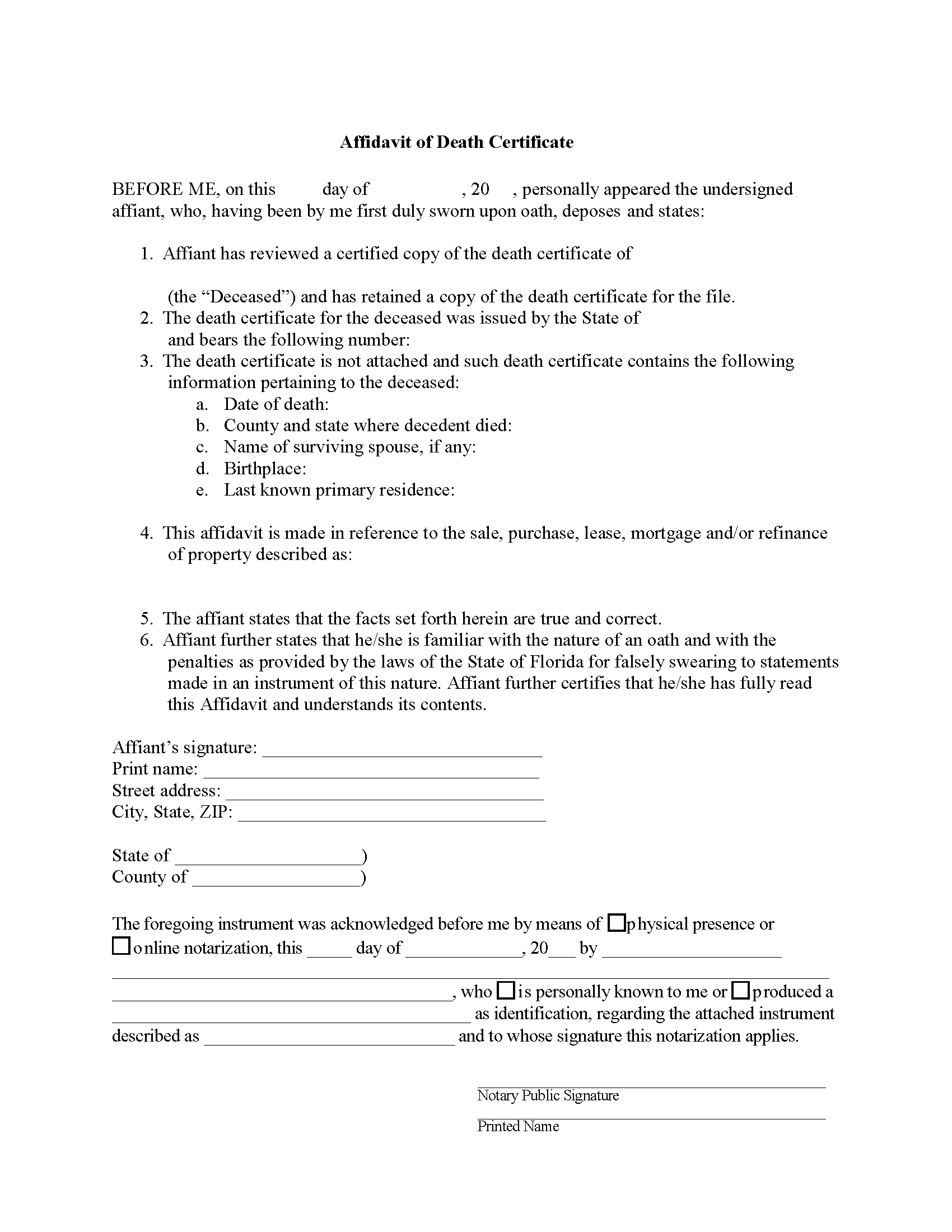
Use this document when a death certificate is required to change the ownership status of real property and the original death certificate is not available. The affiant is an individual who personally reviewed the actual document and swears, under oath, to the accuracy of the information provided on the affidavit.
(Florida Affidavit of Death Package includes form, guidelines, and completed example)... More Information about the Florida Affidavit of Death Certificate
Decedent Interest in Homestead Affidavit
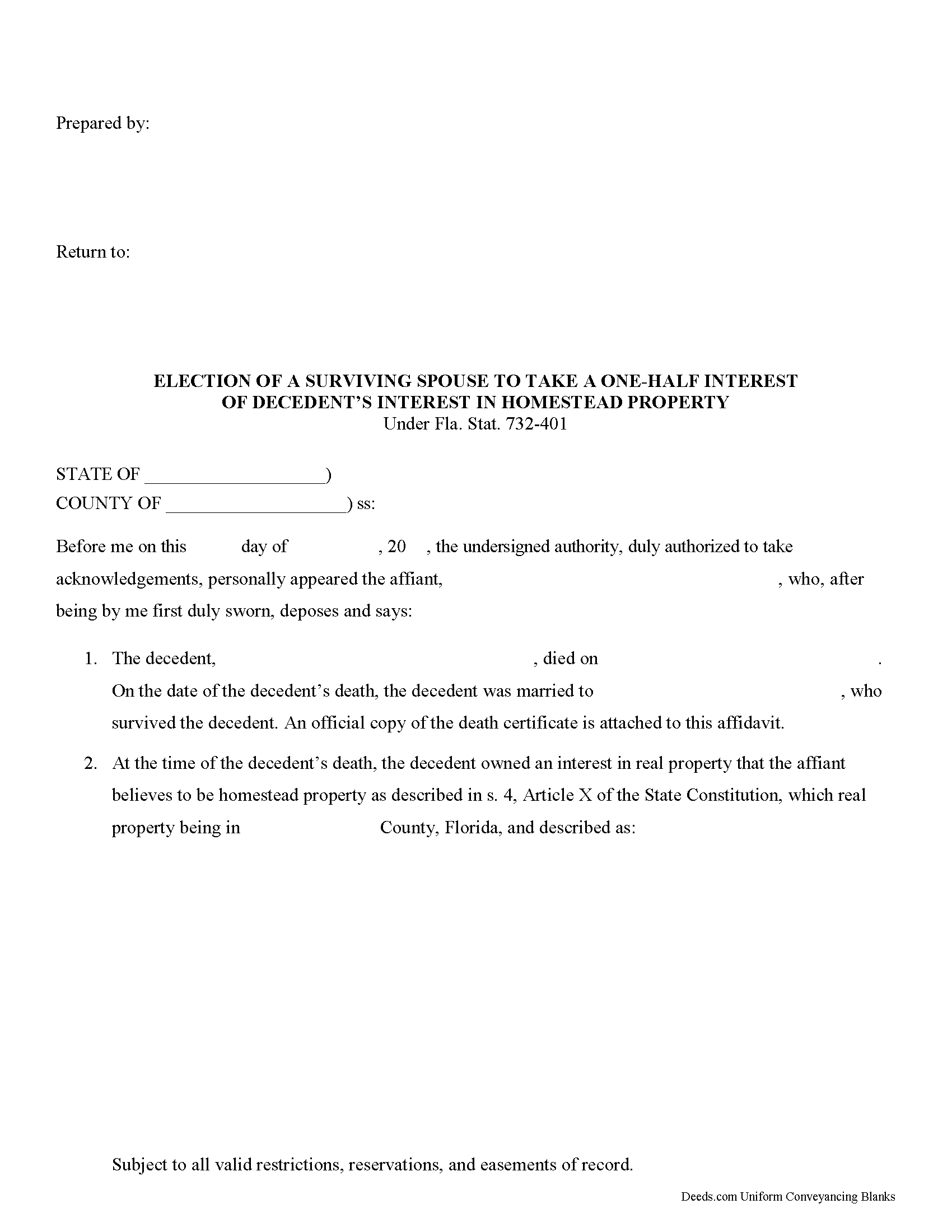
Decedent's interest in homestead affidavit
Under Florida law, real estate that is identified as a homestead but is not included in a deceased owner's will passes to beneficiaries in the same manner as other intestate property. If the decedent is survived by a spouse and one or more descendants, however, the surviving spouse has three main options as set out in section 732.401 of the Florida Statutes:
- take a life estate in the homestead, with a vested remainder to the descendants alive at the time of the decedent's death per stirpes (according to Black's Law Dictionary, 8th ed., "proportionately divided between beneficiaries according to their deceased ancestor's share").
- take an undivided one-half interest in the late spouse's homestead as a tenant in common, with the remaining one-half interest held by any descendants per stirpes.
- disclaim the interest as directed in chapter 739.
When a surviving spouse chooses to take the one-half interest in the property, he/she files a decedent's interest in homestead affidavit. This document allows the spouse to waive the marital rights to a life estate in the property. Instead, the surviving spouse and any descendants hol... More Information about the Florida Decedent Interest in Homestead Affidavit
Personal Representative Deed (Testate)
.png)
Florida Personal Representative's Distributive Deed (testate)
This form is for use by the personal representative designated in the will of a deceased property owner.
Wills, or last wills and testaments, are estate planning documents used to organize and record how people wish to distribute their assets after death. If someone dies after executing and filing a will, their estate is identified as "testate."
Real estate is a common asset, and with proper approval, a personal representative's distributive deed can be used if the personal representative is called upon to sell the property. These instruments are useful because they collect the relevant details about the transfer and the deceased owner into one document.
Personal representative's distributive deeds are used to transfer ownership of real property from a testate estate. Each situation is unique, however, so contact an attorney with specific questions or for complex cases.
(Florida Personal Representative Deed Package includes form, guidelines, and completed example)... More Information about the Florida Personal Representative Deed (Testate)
Personal Representative Deed (Intestate)
.png)
Florida Personal Representative's Distributive Deed (intestate)
This form is for use by the personal representative of an individual who died without a will.
Wills, or last wills and testaments, are estate planning documents used to organize and record how people wish to distribute their assets after death. If someone dies without executing and filing a will, their estate is identified as "intestate."
Without a will to manage this distribution, a personal representative is designated by the county Circuit Court. Because the personal representative in such situations is appointed, sales of assets are generally authorized by the court handling the probate case.
Real estate is a common asset, and with proper approval, a personal representative's distributive deed can be used if the personal representative is called upon to sell the property. These instruments are useful because they collect the relevant details about the transfer and the deceased owner into one document.
Personal representative's distributive deeds are used to transfer ownership of real property from an intestate estate. Each situation is unique, however, so contact an attorney with specific quest... More Information about the Florida Personal Representative Deed (Intestate)
Certificate of Trust
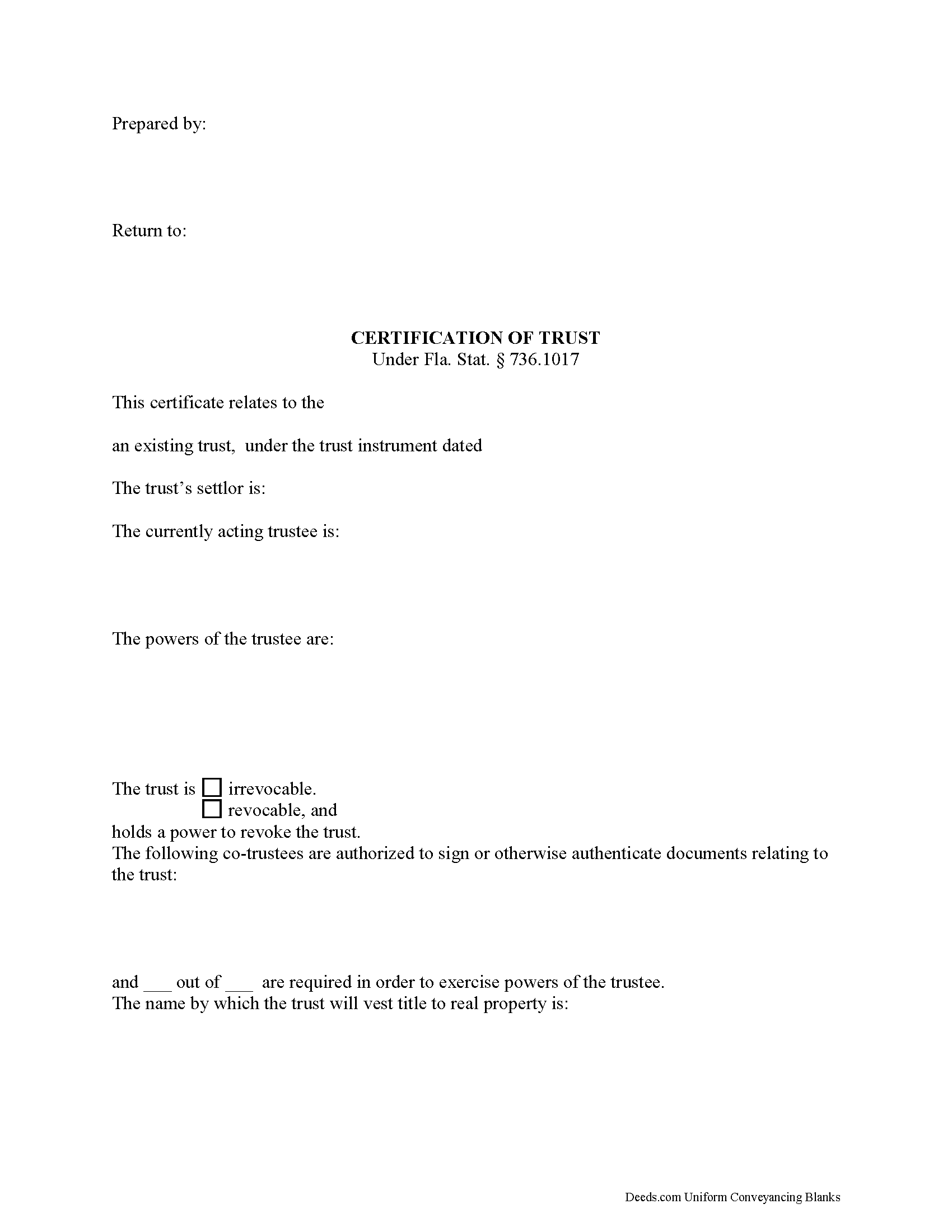
Governed by the Florida Trust Code under Fla. Stat. 736.1017, any trustee may execute and sign a certification of trust in lieu of furnishing a trust instrument (Fla. Stat. 736.1017(2)). The document is proof of a trust's existence, as well as the trustee's authority to act on behalf of the trust.
Lending institutions or other parties might ask for a certification of trust before processing a request, such as opening an account in the trust's name or transferring assets into or out of the trust. The certification contains only the information about the trust needed for the specific pending transaction, and the identities of those having a beneficial interest in the trust remain confidential; trust documents are usually unrecorded and therefore not a matter of public record.
A recipient can request excerpts of the trust instrument concerning the appointment of the trustee and the trustee's powers, as well as excerpts of relevant amendments, but may rely upon information presented in the certificate as fact.
The requirements for a valid certification of trust include the trust's name and date of the trust instrument; the settlor's name; the acting trustee's name; and the ... More Information about the Florida Certificate of Trust
Durable Limited Power of Attorney for Real Estate
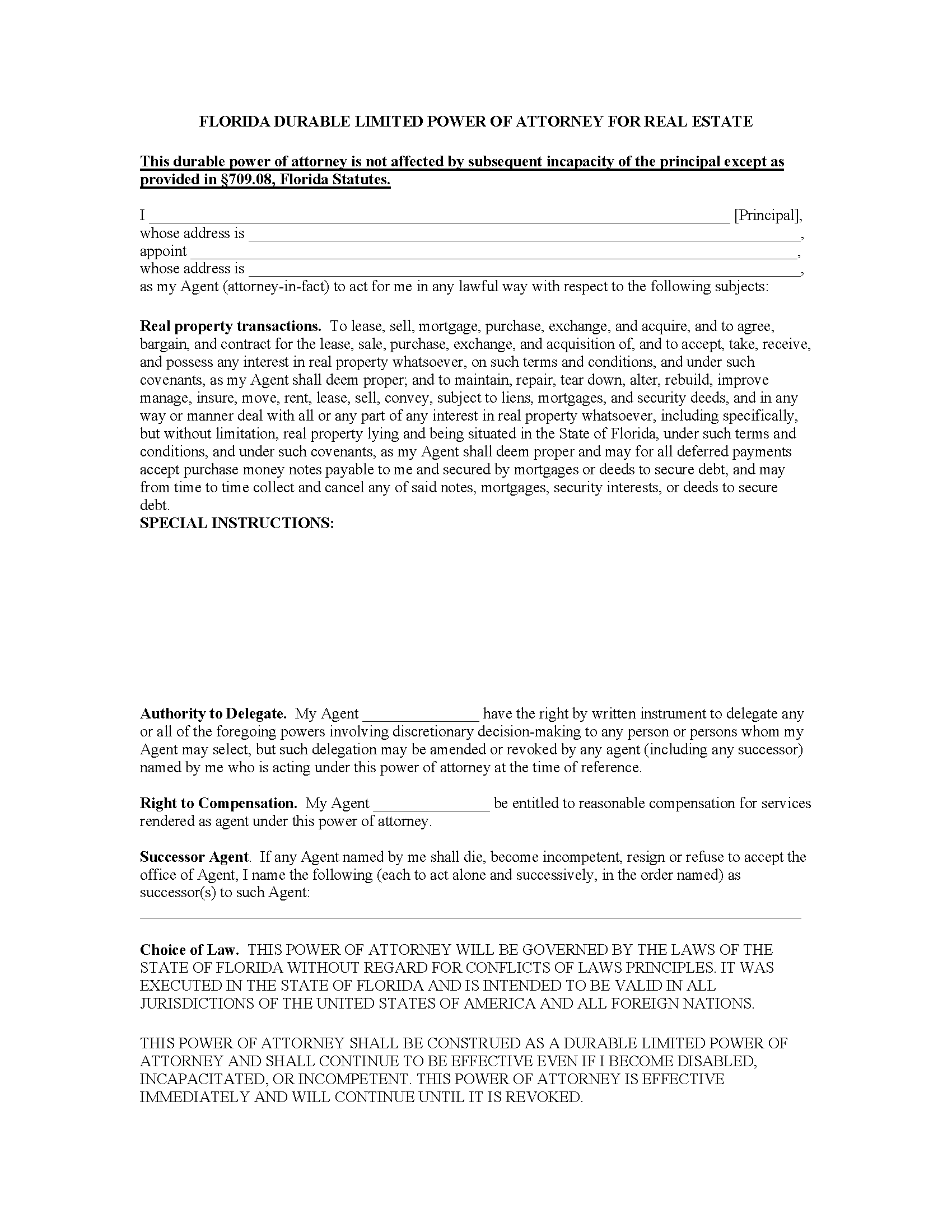
This document creates (under the Florida Power of Attorney Act (Florida statute 709.2101 - 709.2402)) a durable, limited power of attorney for real estate. A power of attorney is a legal document delegating authority from one person to another. In the document, the maker of the power of attorney (the "principal") grants the right to act on the maker's behalf as that person's agent.
The document is specific to real estate (real property), and includes a section to included "specific instructions" to further limit the powers given.
This power of attorney must be signed by the principal and by two witnesses to the principal's signature, and a notary must acknowledge the principal's signature for the power of attorney to be properly executed and valid under Florida law.
Also included is an Affidavit and Acknowledgment of the agent.
This is a LIMITED power of attorney. What is a limited power of attorney? A "limited power of attorney" gives the agent authority to conduct a specific act. For example, a person might use a limited power of attorney to sell a home in another state by delegating authority to another person to handle the transaction locally. Such a power could be ... More Information about the Florida Durable Limited Power of Attorney for Real Estate
Durable Power of Attorney
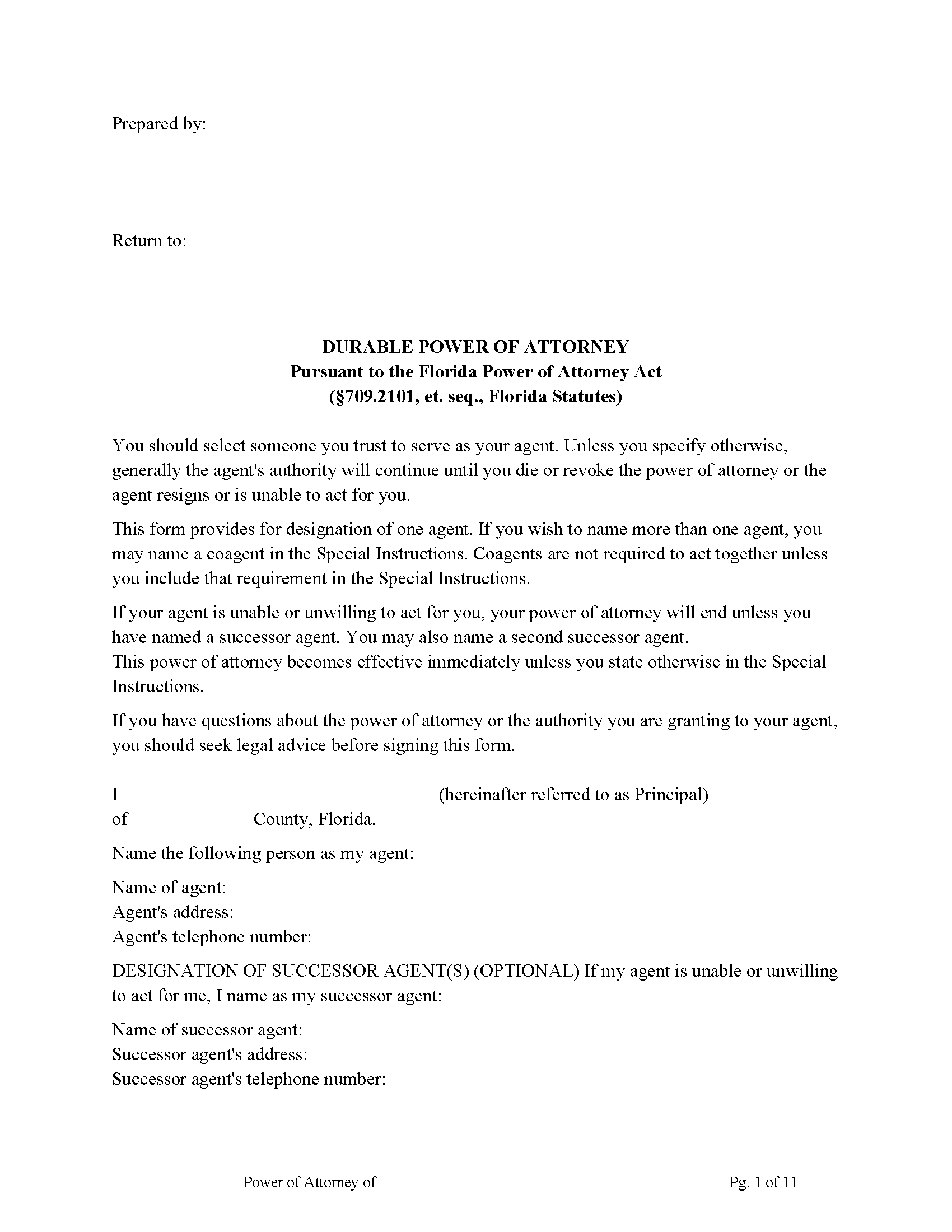
DURABLE POWER OF ATTORNEY
Pursuant to the Florida Power of Attorney Act
(709.2101, et. seq., Florida Statutes)
Duties and Scope of Power of Agent Any agent who shall accept the appointment as my "attorney in fact" must act only within the scope of authority granted in this power of attorney. My agent shall exercise all powers pursuant to F.S. 709.2114. Including, but not limited to, my agent must act in good faith, in my best interest and not contrary to my expectations, actually known by the agent or expressed in writing, such as my estate plan, ownership designations and beneficiary designations.
Items Addressed:
1. Banking and Other Financial Institution Transactions
2. Investment Transactions.
3. Real Property Transactions.
4. Tangible Personal Property Transactions.
5. Business Operation Transactions.
6. Insurance Transactions.
7. Estates, Trusts and other Beneficial Interests
8. Claims and Litigation
9. Personal and Family Maintenance
10. Benefits from C... More Information about the Florida Durable Power of Attorney
Mortgage Instrument and Promissory Note
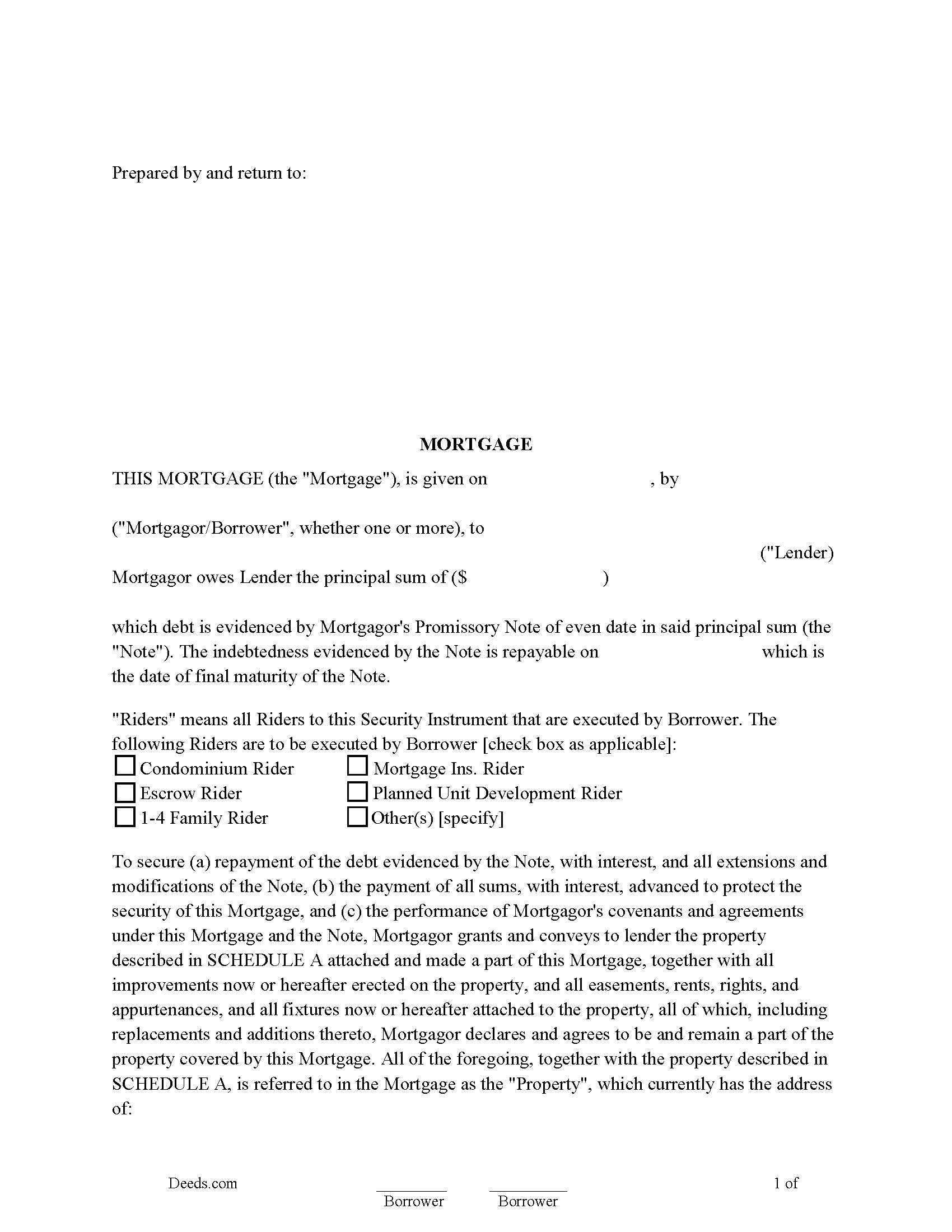
Use this mortgage for financing residential property, condominiums, planned unit developments and land. This mortgage and promissory note can be used for conventional financing or balloon payments. In Florida [every mortgage in which the final payment or the principal balance due and payable upon maturity is greater than twice the amount of the regular monthly or periodic payment of the mortgage shall be deemed a balloon mortgage; and, except as provided in subparagraph 2., there shall be printed or clearly stamped on such mortgage a legend in substantially the following form: THIS IS A BALLOON MORTGAGE AND THE FINAL PRINCIPAL PAYMENT OR THE PRINCIPAL BALANCE DUE UPON MATURITY IS $, TOGETHER WITH ACCRUED INTEREST, IF ANY, AND ALL ADVANCEMENTS MADE BY THE MORTGAGEE UNDER THE TERMS OF THIS MORTGAGE.] [697.05(2)(a)1]. A mortgage and promissory note with strict default terms can be beneficial to a party financing a real property.
(Florida Mortgage Package includes forms, guidelines, and completed example)
For use in Florida Only.
... More Information about the Florida Mortgage Instrument and Promissory Note
Mortgage with Assignment of Rents and Promissory Note
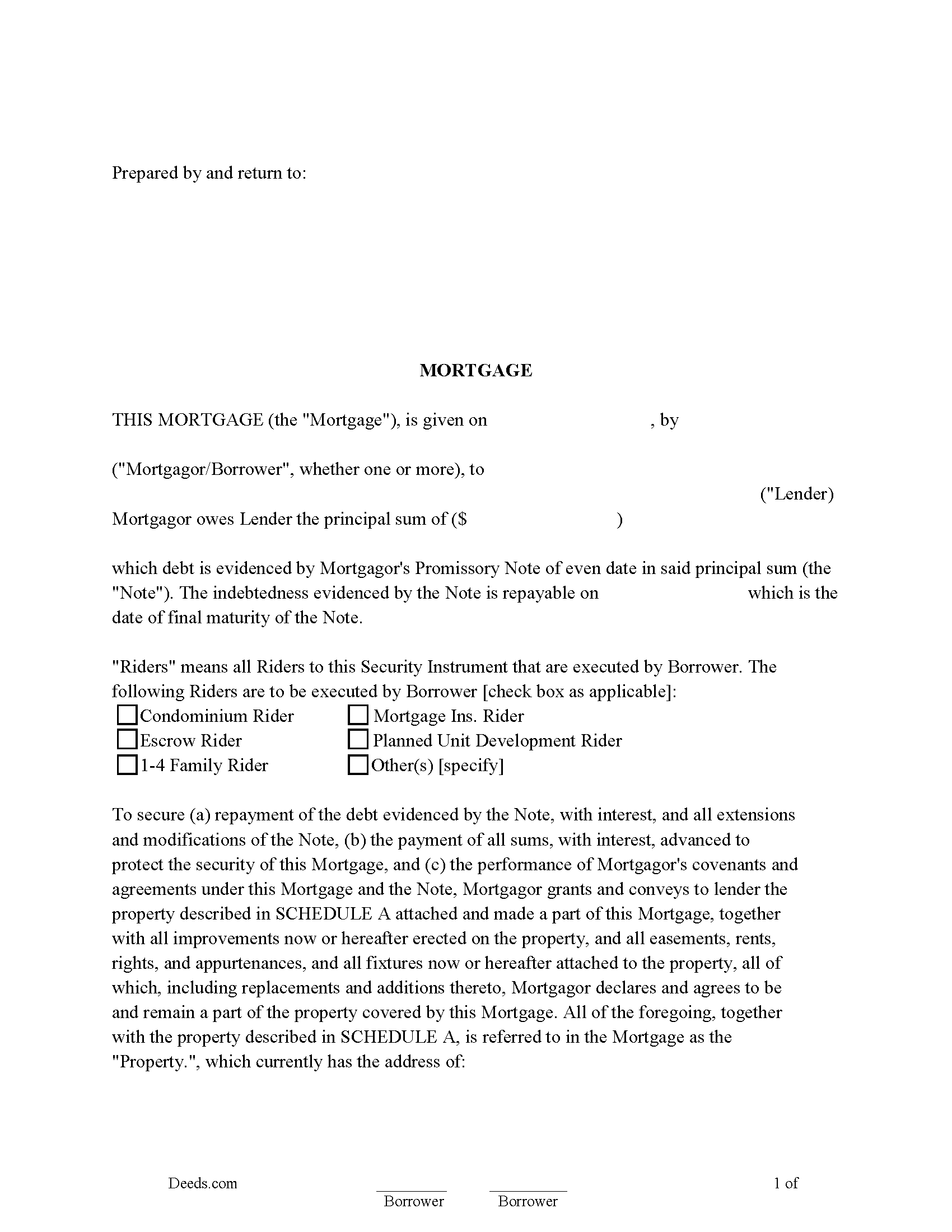
Use this mortgage for financing rental property. The mortgagor/borrower assigns the Lender the right to collect rents. The Lender waives the right to collect rents to the mortgagor/borrower until the occurrence of an event of default under the Promissory Note or the Mortgage. Upon the occurrence of an event of default, upon five (5) days written notice from Lender, the right of Mortgagor/borrower to collect such rents and profits may be revoked by Lender. This mortgage and promissory note can be used for conventional financing or balloon payments. In Florida [every mortgage in which the final payment or the principal balance due and payable upon maturity is greater than twice the amount of the regular monthly or periodic payment of the mortgage shall be deemed a balloon mortgage; and, except as provided in subparagraph 2., there shall be printed or clearly stamped on such mortgage a legend in substantially the following form: THIS IS A BALLOON MORTGAGE AND THE FINAL PRINCIPAL PAYMENT OR THE PRINCIPAL BALANCE DUE UPON MATURITY IS $ , TOGETHER WITH ACCRUED INTEREST, IF ANY, AND ALL ADVANCEMENTS MADE BY THE MORTGAGEE UNDER THE TERMS OF THIS MORTGAGE.] [697.05(2)(a)1]. A mortgage and p... More Information about the Florida Mortgage with Assignment of Rents and Promissory Note
Satisfaction of Mortgage
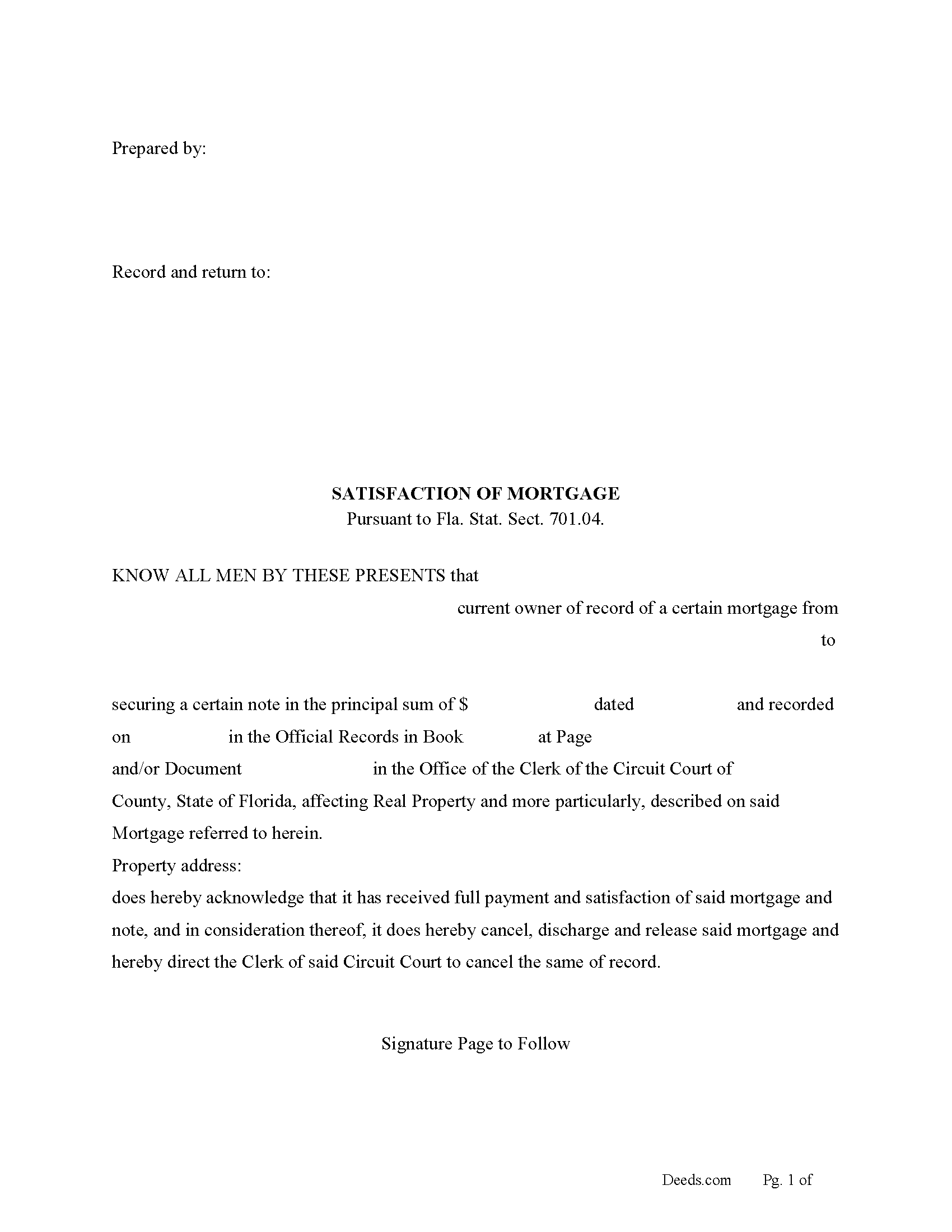
(The mortgagee, creditor, or assignee, or the attorney of record in the case of a judgment) generally has (60 days after the date of receipt of the full payment of the mortgage, lien, or judgment, the person required to acknowledge satisfaction of the mortgage, lien, or judgment shall send or cause to be sent the recorded satisfaction to the person who has made the full payment. In the case of a civil action arising out of this section, the prevailing party is entitled to attorney fees and costs.) (Florida Statute 701.04(2)) This is a recorded document, for use in Florida only.
(Florida Satisfaction of Mortgage Package includes form, guidelines, and completed example)... More Information about the Florida Satisfaction of Mortgage
Memorandum and Notice of Agreement
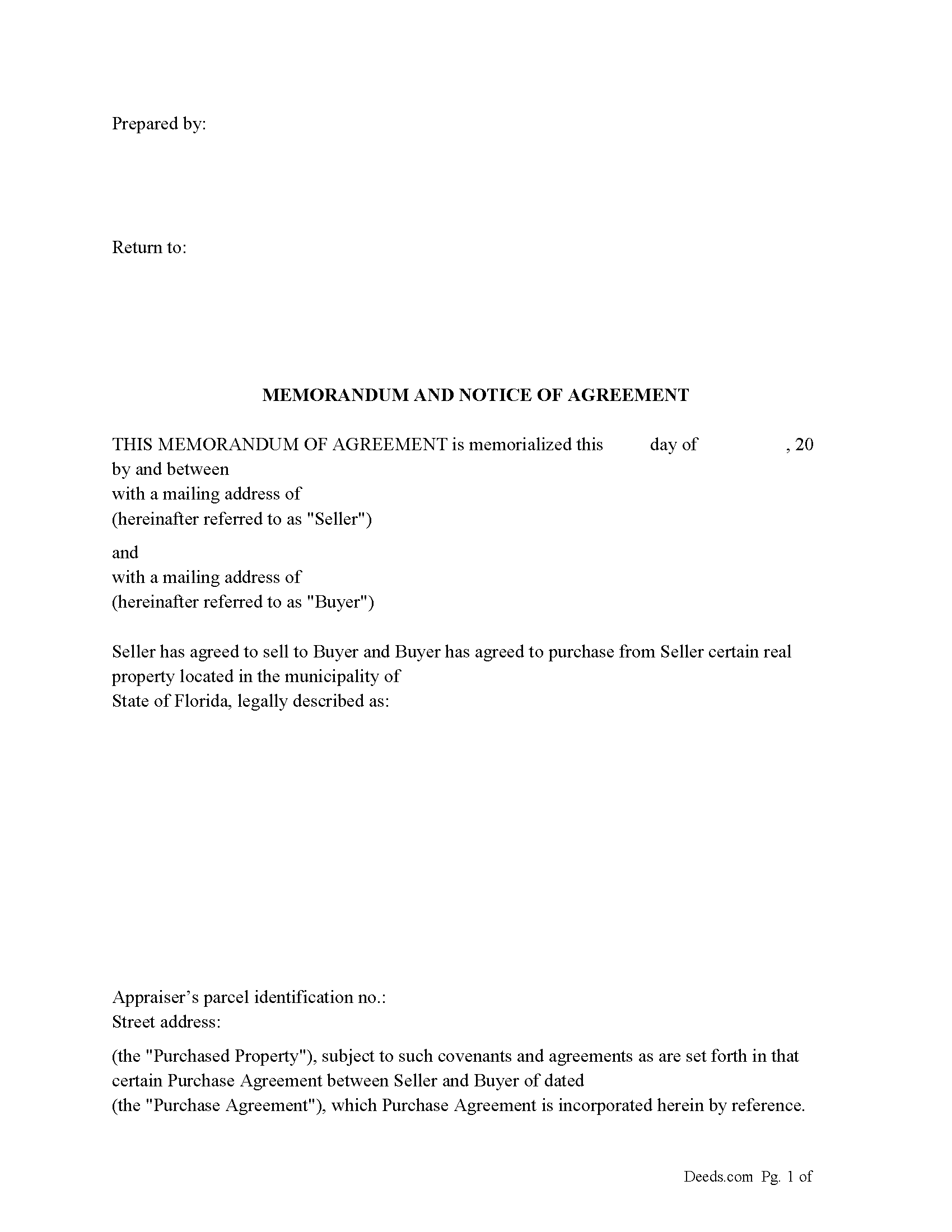
In Florida, a "Memorandum of Purchase Agreement" commonly referred to as a "Memorandum of Agreement" (MOA) or "Memorandum of Understanding" (MOU) in the context of real estate, is used primarily as a means to provide public notice of an equitable interest in a real estate transaction without disclosing the full details of the purchase agreement. This document is particularly useful in transactions where the buyer and seller have agreed to terms but the final closing and transfer of the deed have not yet occurred. By recording this memorandum with the county recorder's office, the buyer establishes a public record of their interest in the property, which can protect against subsequent claims or liens by third parties.
Key Purposes of a Memorandum of Purchase Agreement:
1. Notice of Equitable Interest: The memorandum serves as notice to the public that the buyer has an equitable interest in the property due to the purchase agreement. This is important in protecting the buyer’s interest against claims by other parties who might otherwise be unaware of the agreement.
2. Protection During the Closing Process: Real estate transactions can involve a lengthy closing process, incl... More Information about the Florida Memorandum and Notice of Agreement
Notice of Commencement
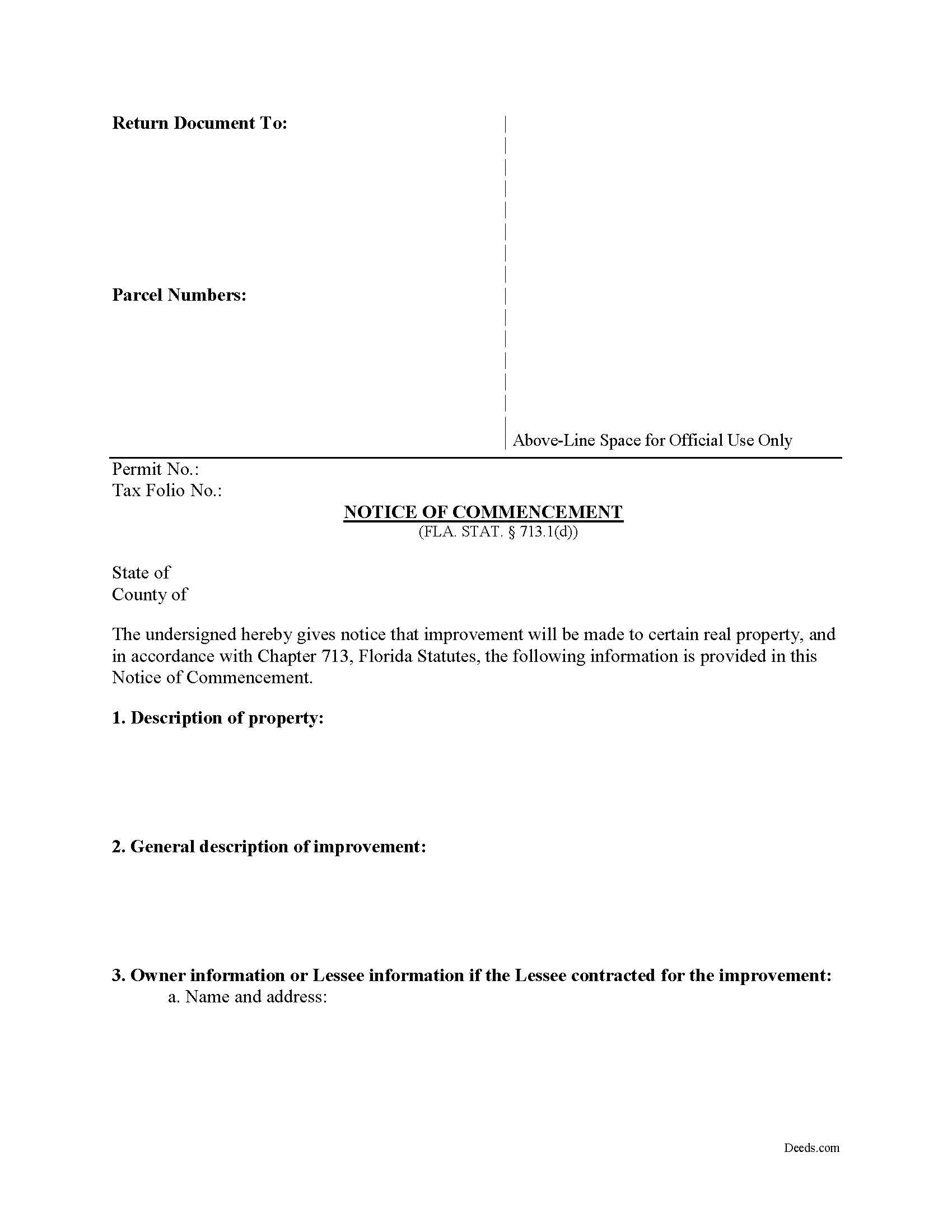
Why use a Notice of Commencement in Florida?
As an owner of real estate, you must record a Notice of Commencement when a contractor, subcontractor, material provider or laborer starts a work or improvement on your property.
The Notice of Commencement is set forth under the Florida mechanic's lien law. The lien statute aims to provide notices to contractors, owners, subcontractors, material men and laborers so each has everybody else's notice that they're working on the job and therefore may have potential mechanic's lien claims. By recording the Notice of Commencement, such notice is made available to all interested parties. Therefore building permits will usually not be issued to contractors unless the notice of commencement was properly recorded.
The Notice of Commencement must contain a description sufficient for identification of the real property, a description of the improvement, name and address of the owner, and information to identify the lender and surety, if any. This allows potential lien claimants to identify the owner and everyone else with a potential interest in the real estate. Property owners are required to file the notice before the work or improvement... More Information about the Florida Notice of Commencement
Notice to Owner
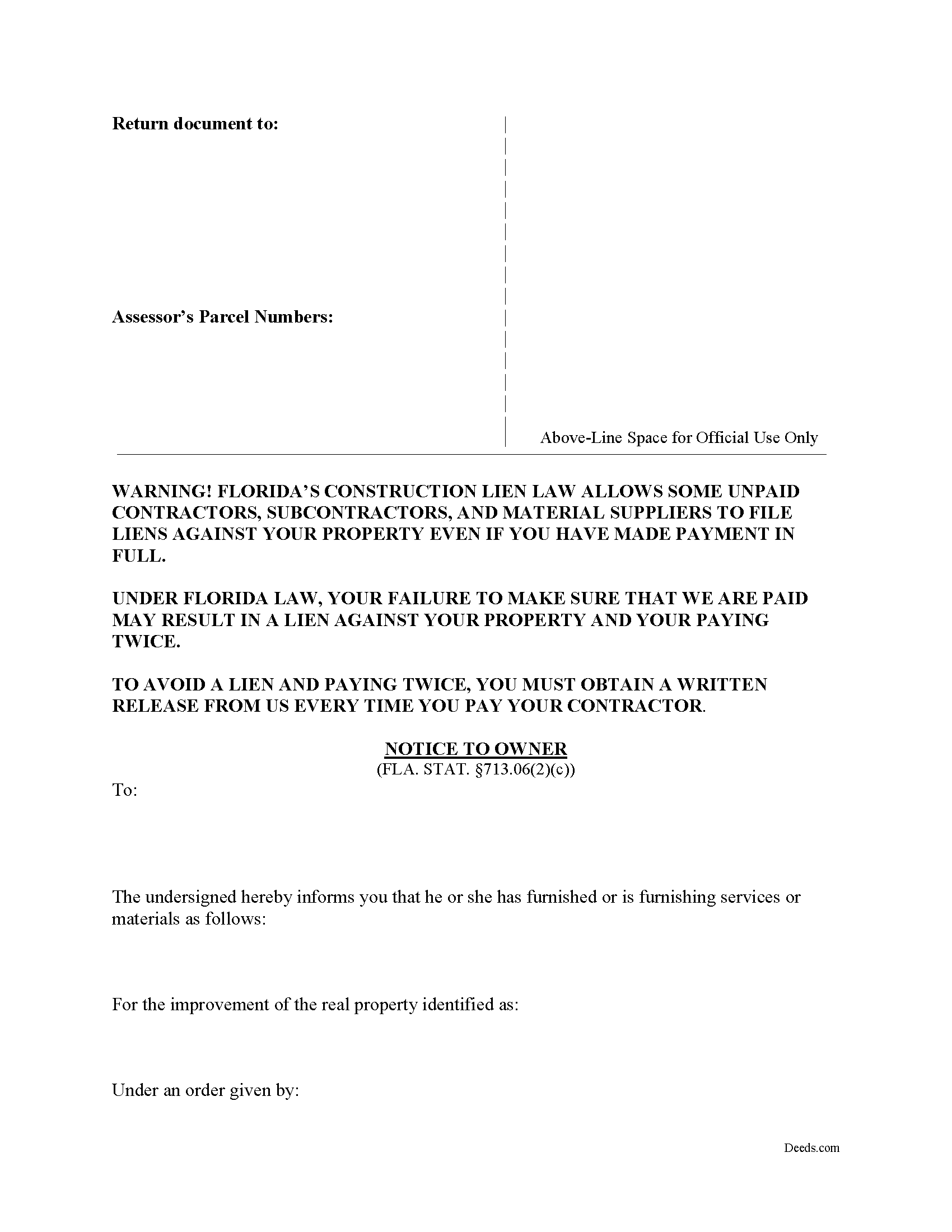
A statutory Notice to Owner (NTO) form, under section 713.06 of the Florida Revised Statutes, is a fairly simple document. Sent to an owner by any lienor (subcontractor, sub-subcontractor or material supplier without a direct contract between the two parties), this document informs the owner that the lienor has or will commence the supply of labor, services, or materials for the purpose of improving their real property. The NTO is a first step in securing a mechanics lien on the property.
Florida's lien statute requires lienors as defined at 713.01(18-20) to serve the owner with a NTO form, even if the claimant is not a direct party to a contract with the owner. The lien law sets forth the required contents of the NTO, which must include the lien claimant's name and address, a description of the property, and a description of the services or materials furnished. The claimant must serve the owner either before commencement of the work or furnishing of materials, or within 45 days of such furnishing. Failure to serve the NTO in accordance with the lien statute renders associated liens invalid.
The NTO should be served on the owner in accordance with service methods prescribed ... More Information about the Florida Notice to Owner
Final Payment Affidavit
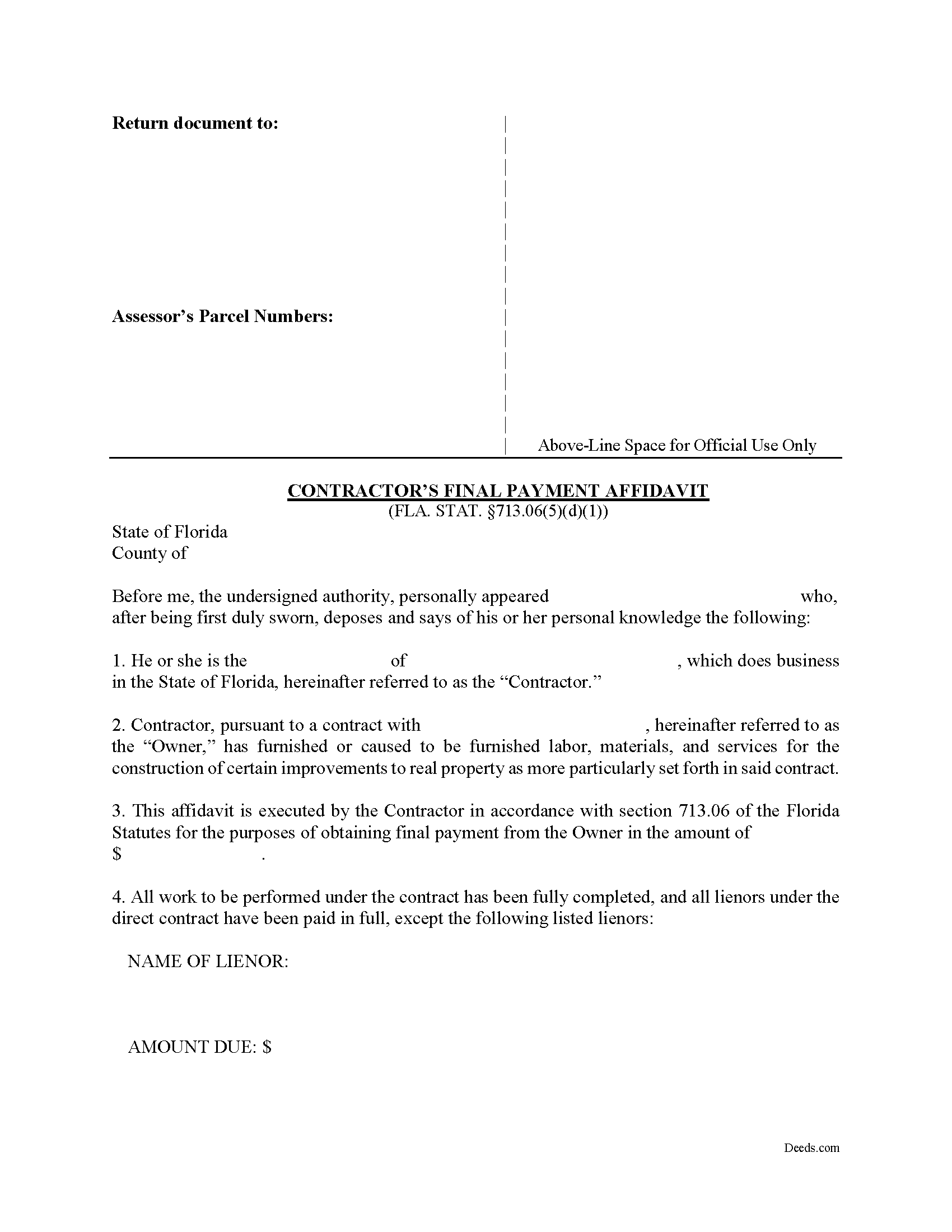
Why do I need a contractor's final payment affidavit?
Florida law requires that the contractor's final payment affidavit be presented to the owner when it's time to make the final payment on the project. The affidavit is only required by contractors, so subcontractors and materialmen need not provide any individual documents. The affidavit sets forth the amount of final payment due and affirms that all lienors have been paid in full (except for those specifically listed in the document as remaining unpaid). The affidavit is used in order to prevent the owner from having to pay twice.
If you fail to serve the owner with the final payment affidavit, you forfeit any lien right or right of action against the owner for labor, services, or materials furnished under the direct contract. Note that erroneously including or omitting any information in the affidavit, even if the owner accepts it, does not defeat an otherwise valid lien. Regardless, accuracy matters because the statement is given under oath, and an incorrect affidavit may be used in court to discredit the contractor's claims.
The contractor must execute the affidavit and deliver it to the owner at least 5 days before... More Information about the Florida Final Payment Affidavit
Claim of Lien
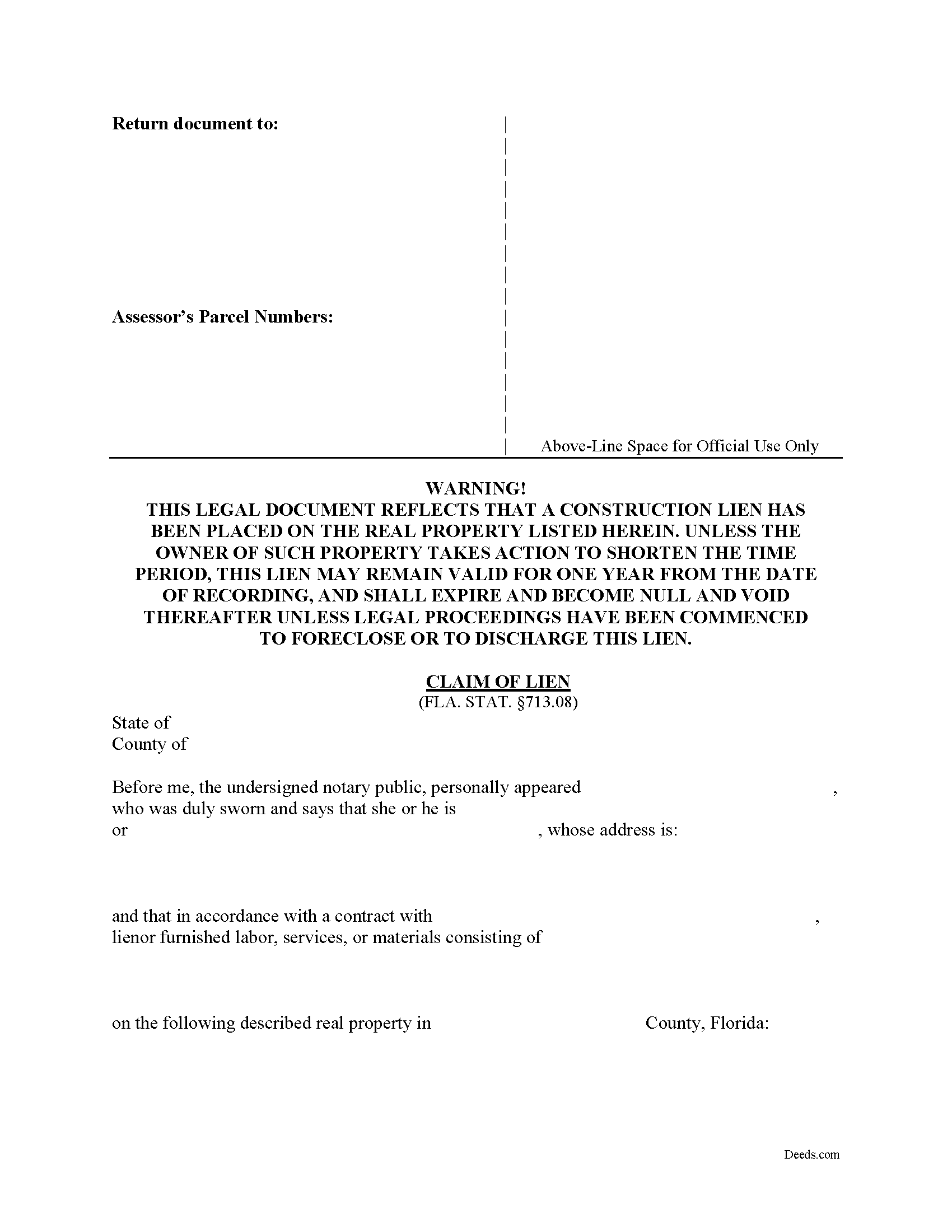
What is a Claim of Lien?
A claim of lien is a legal claim to property that operates as security against any amount of money or services owed to another person or entity. A claim of lien must be recorded in a public records office so that anyone else with a potential interest in the property has notice of the pending claim. Filing this form places a lien on the property, which restricts the owner's ability to use it as collateral for a loan, sell it, or otherwise transfer it. A lien can also be foreclosed by filing a lawsuit in order to force a sale and pay all lien claimants according to what they are owed and what order they are to be paid.
Filing and recording a claim of lien is an essential step in ensuring that you have priority of payment versus all other lien claimants with their own potential claims against the property. Unless you are providing labor only, prior to filing your claim of lien, you must first serve a notice on the owner setting forth the lienor's name and address, a description sufficient for identification of the real property, and the nature of the services or materials furnished or to be furnished. FLA. STAT. 713.06(2)(a).
You must file your clai... More Information about the Florida Claim of Lien
Notice to Contractor
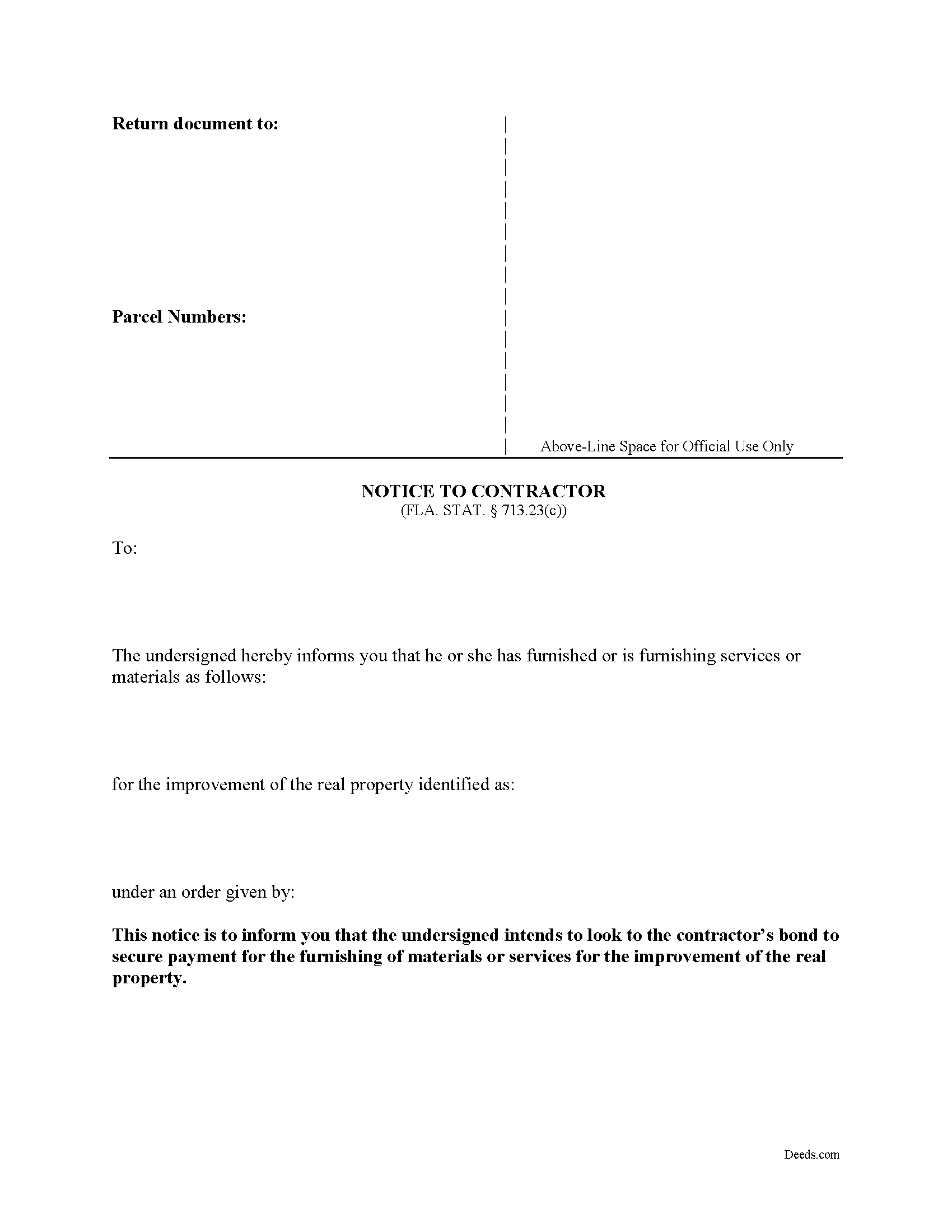
Under Florida law, a statutory Notice to Contractor form is used to inform its recipient that the claimant intends to rely upon the contractor's surety bond to secure payment for the furnishing of materials or services for the improvement of the real property. See FLA. STAT. 713.23(c).
This form identifies the relevant parties, including the owner, who ordered the work, the general contractor, who coordinates the project, and the lienor, or subcontractor, who is completing the assigned tasks, and who holds a claim (lien) against the contractor's bond to ensure payment. It also provides information about the property's location and specifies the type of improvement and associated materials.
Before beginning or within 45 days after beginning to furnish labor, materials, or supplies, a lienor who is not contractually connected with the contractor, except a laborer, shall serve the contractor with notice in writing that the lienor will look to the contractor's bond for protection on the work. FLA. STAT. 713.23(c) If a notice of commencement with the attached bond is not recorded before construction begins, the lienor not under contract with the contractor may, in the alterna... More Information about the Florida Notice to Contractor
Notice of Termination
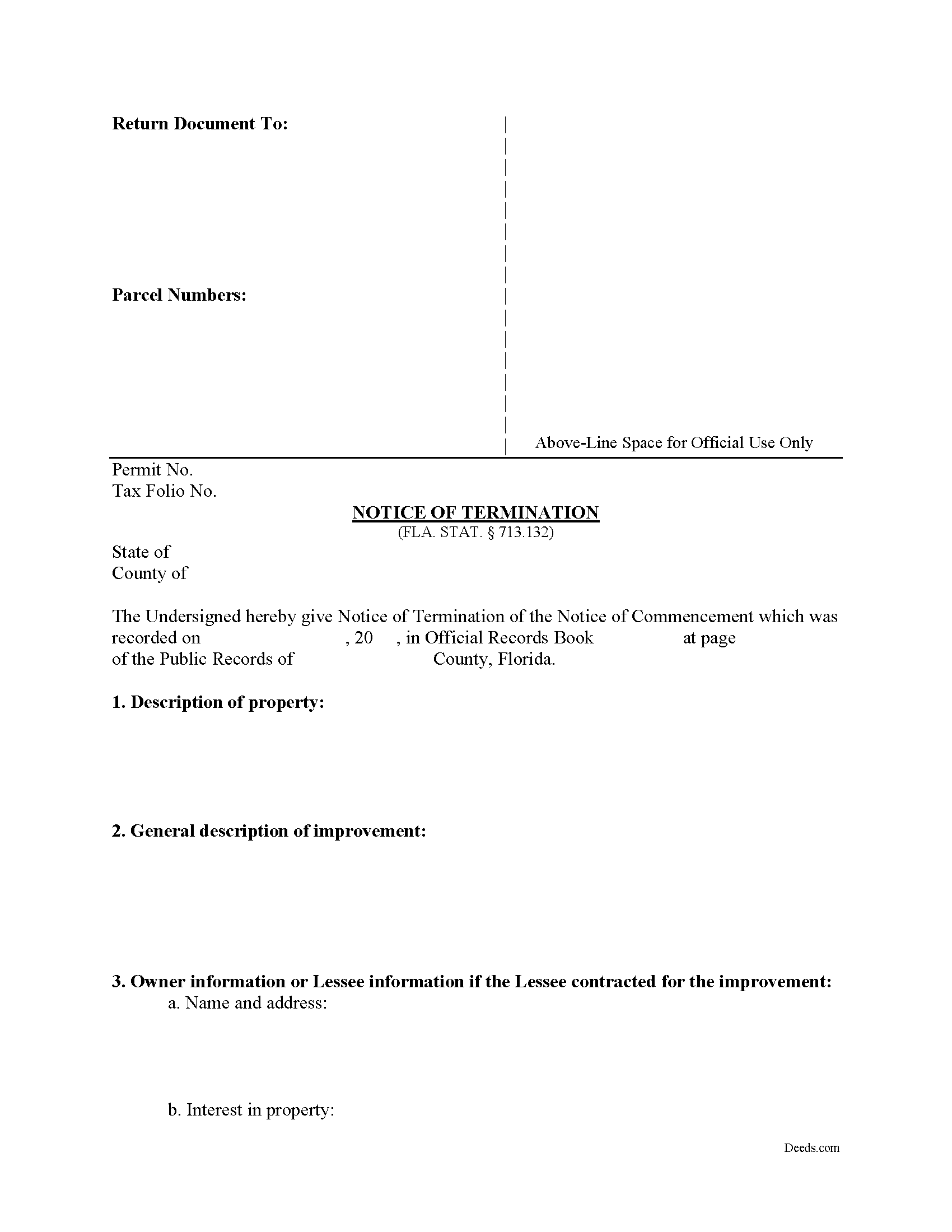
Using a Florida Notice of Termination
When properly executed and filed, a statutory Notice of Termination operates to terminate a Notice of Commencement.
Under Florida lien law, you must record a Notice of Commencement when a contractor, subcontractor, material provider or laborer starts work on your property. This provides notice to contractors, owners, subcontractors, material men and laborers working on the job who may have potential mechanic's lien claims. A Notice of Commencement becomes ineffective within 90 days after filing if work has not begun, and expires completely one year after filing (unless otherwise stated in the Notice). Sometimes, though, it becomes necessary to terminate the Notice of Commencement before either of these automatic expiration dates occur.
The Notice of Termination document provides notice to all interested parties that the Notice of Commencement is no longer effective. Additionally, a notice of termination contains an affirmation that all lienors have been paid in full. An owner may not record a notice of termination until after the completion of construction, or after construction ceases before its completion and all lienors have been p... More Information about the Florida Notice of Termination
Notice of Nonpayment
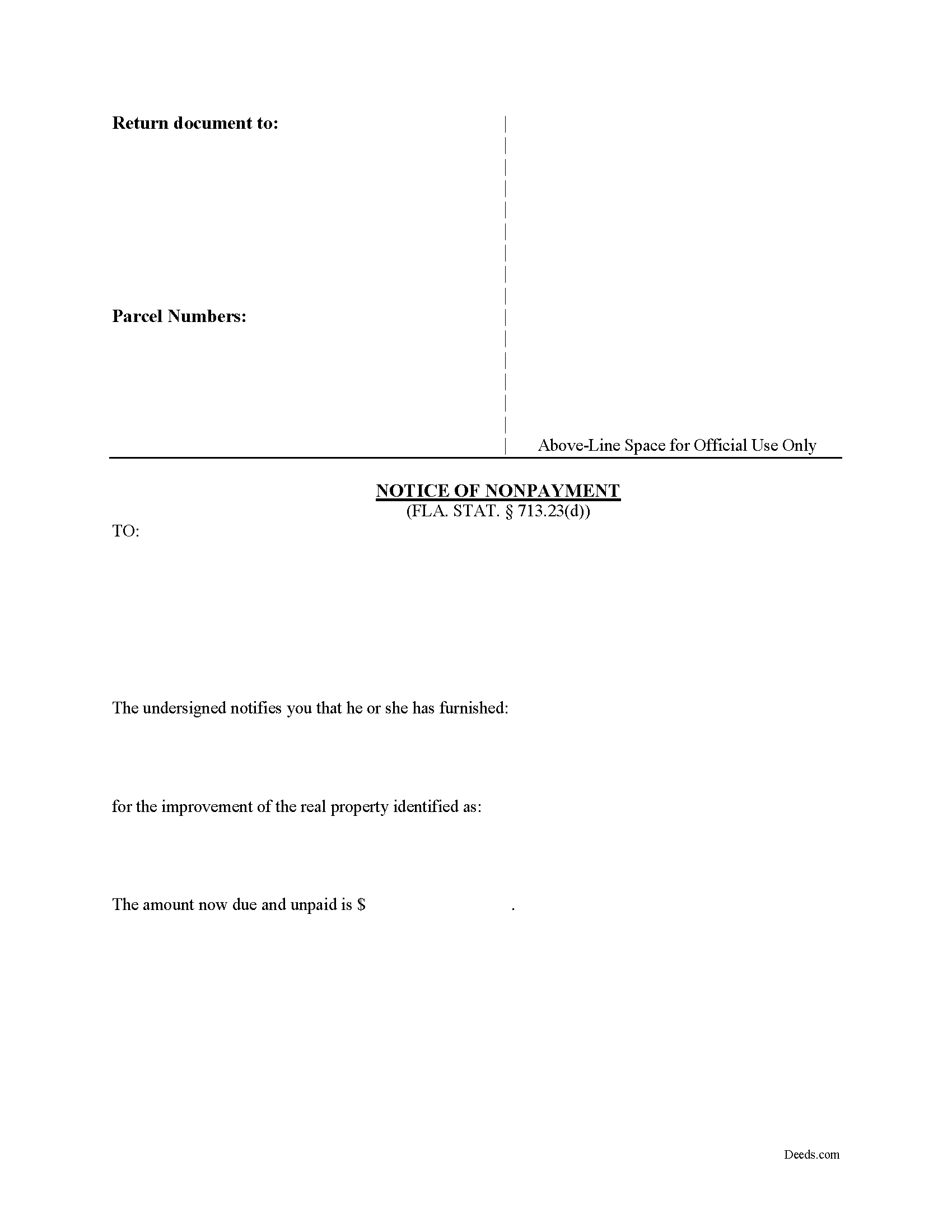
What is a Notice of Nonpayment?
Codified at FLA. STAT. 713.23(d), the Notice of Nonpayment form is used to provide the contractor or surety with notice that the lienor has furnished certain labor, services or materials for improvement of real property and to notify each party of the amount that remains due and unpaid.
After the completion (or termination) of the furnishing of labor or materials on a bonded project for which you are still owed payment, you should complete and record this form. The Notice is like a lien but instead of attaching to the subject property, it attaches to the payment bond.
To recover an outstanding balance under the bond, the lienor must serve the contractor with a notice of nonpayment in addition to a notice to contractor form. The lienor must serve this written notice no later than 90 days after the final furnishing of labor, services, or materials. Remember that the time for serving the written notice of nonpayment is ONLY measured from the last day that the lienor furnishes labor, services, or materials. Id.
A valid notice of nonpayment form must include both the contractor's and surety's name and address, a description of the labor or m... More Information about the Florida Notice of Nonpayment
Notice of Contest of Lien
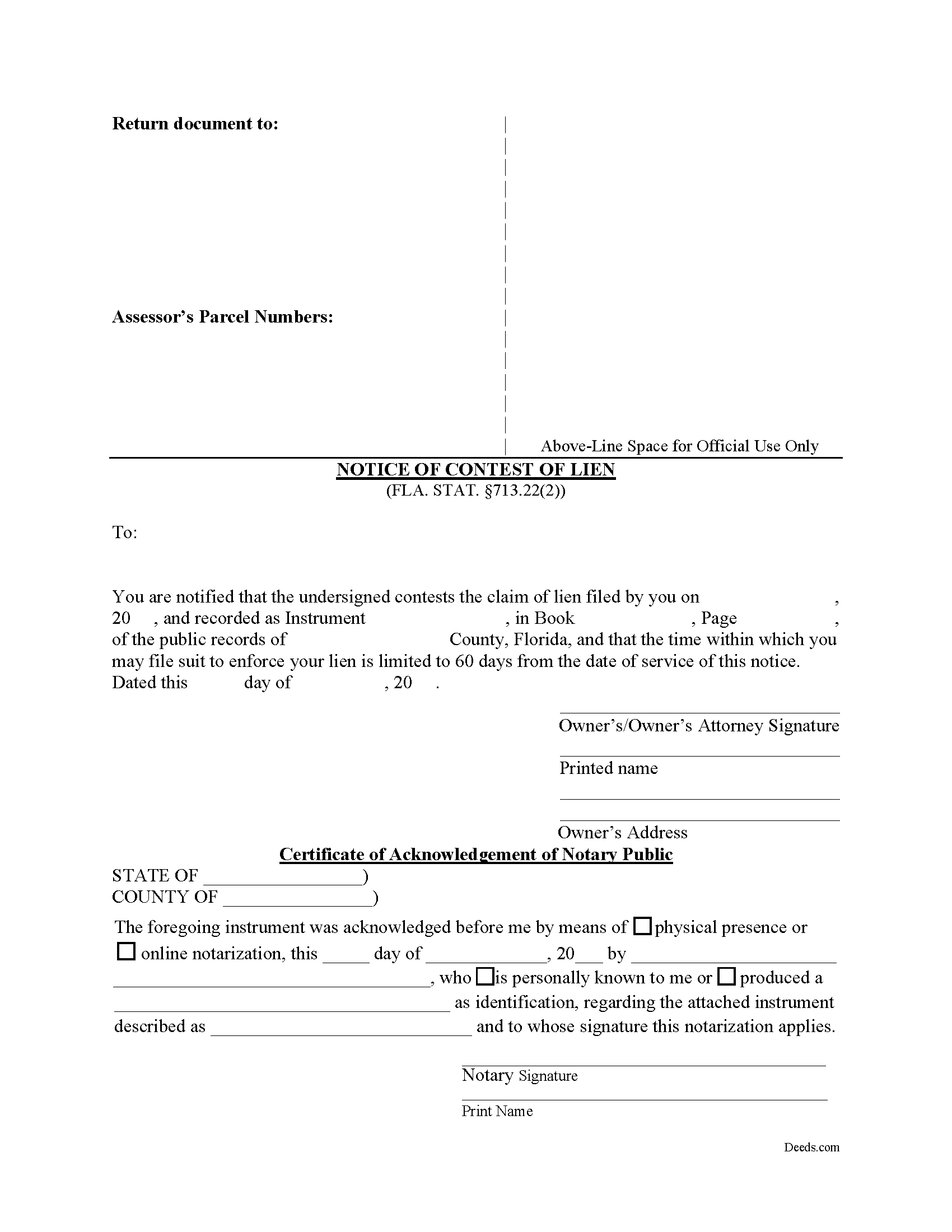
Contesting a Mechanic's Lien in Florida
Under Florida law, filing a statutory Notice of Contest of Lien can defend property against a lien. See 713.22 Fla. Stat (2016).
A mechanic's lien, when filed against property, is valid for one year after the recording date. ( 713.22(1)). The lienor can extend that time past one year by filing a lawsuit to enforce the lien prior to its expiration. When a lien is recorded, however, a property owner may file a Notice of Contest of Lien within the one-year period to dispute the lien's validity. This Notice includes the lienor's name and address, details about the recorded lien, the owner's name, and the signing date. It should also meet all state and local formatting requirements for documents submitted for recording.
Once the notice is recorded, the clerk serves it on the lienor at the address in the lien, putting the lienor on notice that he or she must file a lawsuit to enforce the lien within 60 days. This can shorten the enforceability period because once the lienor receives the Notice of Contest of Lien. If the lienor fails to file a lawsuit within the shortened timeframe, it renders the lien invalid.
Each case is unique, so... More Information about the Florida Notice of Contest of Lien
Notice of Contest of Claim Against Payment Bond
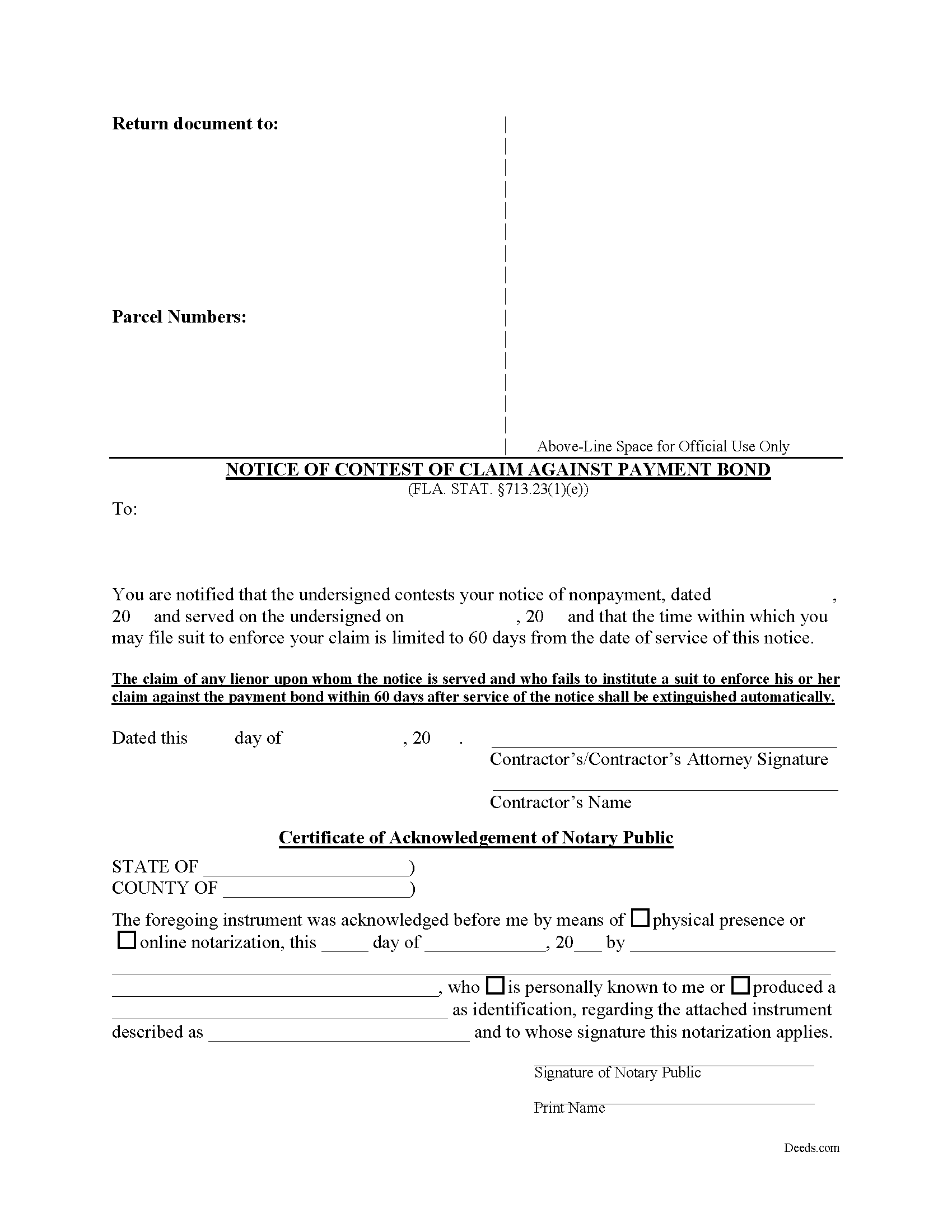
A statutory Notice of Contest of Claim against a Payment Bond, as set forth by 713.23(1)(e) Fla. Stat. (2016), is used by a contractor or her attorney to dispute a demand for payment for labor, services, or materials. A contractor or the contractor's attorney may also use this form to shorten the time allotted to commence a claim against a payment bond provided under this section or 713.245.
Before filing this notice, the lienor must have recorded both a Notice to Contractor and a Notice of Nonpayment. As specified in 713.23, an "action for the labor or materials or supplies may not be instituted or prosecuted against the contractor or surety unless both notices have been given, if required by this section."
Further, the law limits the window to initiate an action against the contractor or against the surety on the bond to one year from the performance of the labor or completion of delivery of the materials and supplies. The countdown starts on the last day of furnishing labor, services, or materials by the lienor, and exceeding the time limit will likely invalidate the lienor's claim.
This document includes the name and address of the lienor, the dates on which the not... More Information about the Florida Notice of Contest of Claim Against Payment Bond
Unconditional Waiver and Release of Lien upon Progress Payment
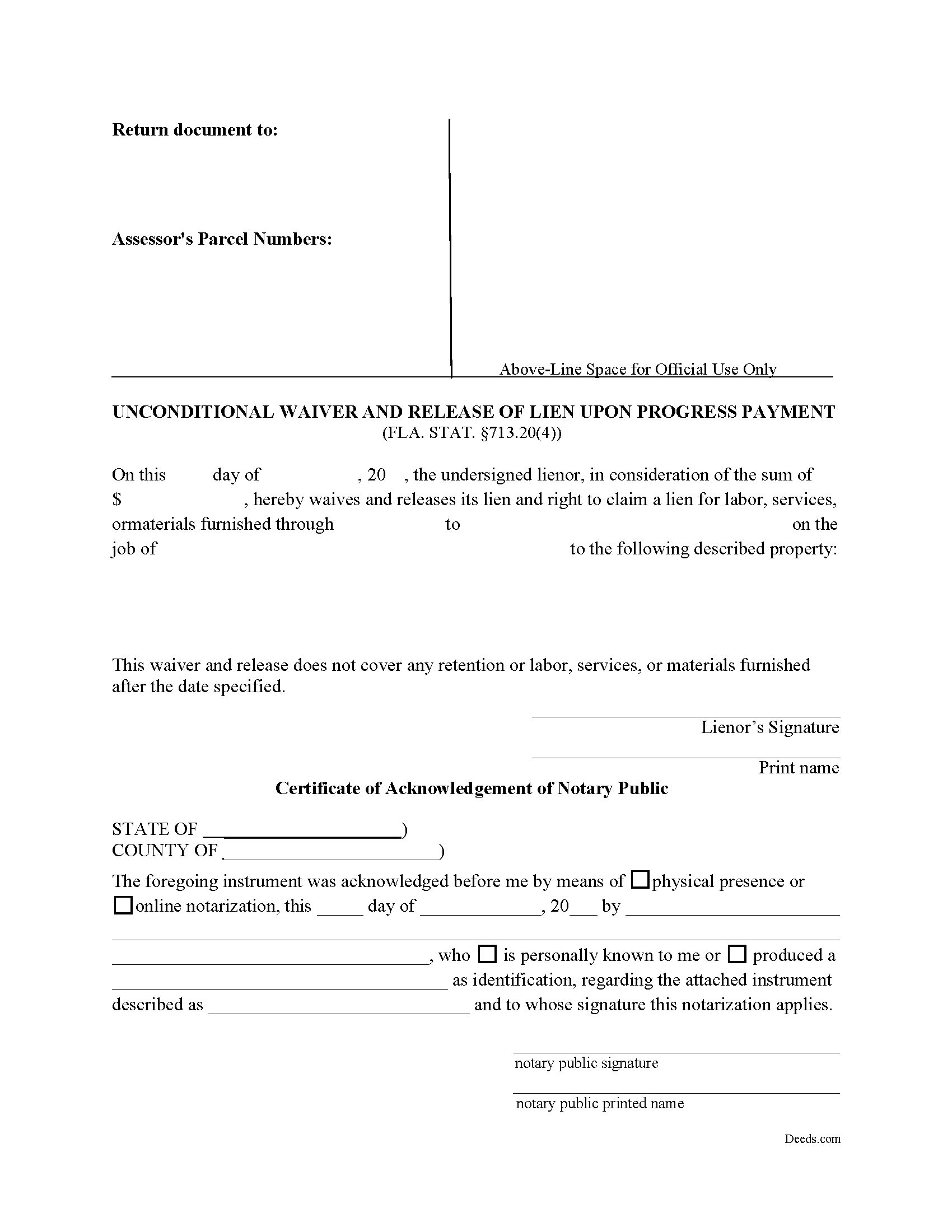
Florida's Construction Lien Law codifies statutory waivers at section 713.20.
A lien waiver operates by waiving (disclaiming) the lienor's right to all or part of an established lien. Lien waivers can be conditional, or only effective when the payment is actually received, or unconditional, meaning the lien is waived upon execution of the form, regardless of any remaining balance due. s. 713.20(7) Fla. Stat. (2016). They can also release a lien based on partial or full payment.
This form unconditionally releases a portion of the lien based on an agreed-upon progress payment. It requires a return address, the parcel identifier and legal description for the property being improved, the lienor's name, the customer's name, the owner's name, the amount paid, and an ending date for the period of time covered by the payment. 713.20(4).
Exercise caution when using unconditional waivers. If the lienor suspects for any reason that the payment is or will be invalid, he or she should consider a conditional waiver instead.
Each case is unique. Contact an attorney for complex situations or with questions about using an unconditional waiver and release of lien upon progress payment, ... More Information about the Florida Unconditional Waiver and Release of Lien upon Progress Payment
Conditional Waiver and Release of Lien upon Progress Payment
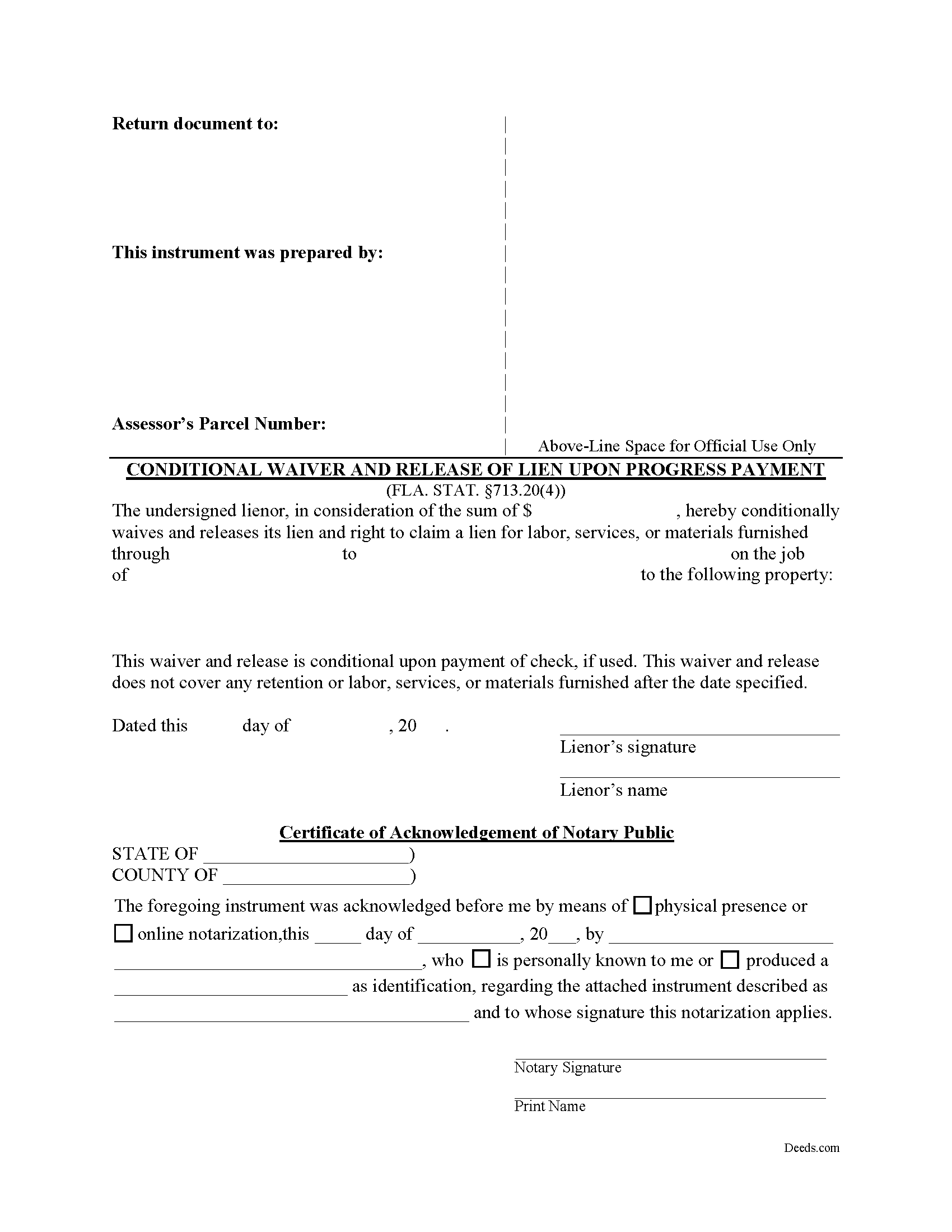
Lien waivers or releases are used to surrender the right to a lien, either in full or in part depending on what type of lien release form is used. Florida's Construction Lien Law authorizes statutory waivers at 713.20 Fla. Stat. (2016).
Under 713.20(4), lienors may waive, on condition of payment, part of a lien they already delivered against the owner's interest in the improved property. Such a release contains information about the lienor, the customer, the property owner, the property description, the payment amount, and a date to mark the end of the work period covered by the waiver.
Each case is unique, so contact an attorney with specific questions or any other issues related to Florida Construction Liens.... More Information about the Florida Conditional Waiver and Release of Lien upon Progress Payment
Unconditional Waiver upon Final Payment
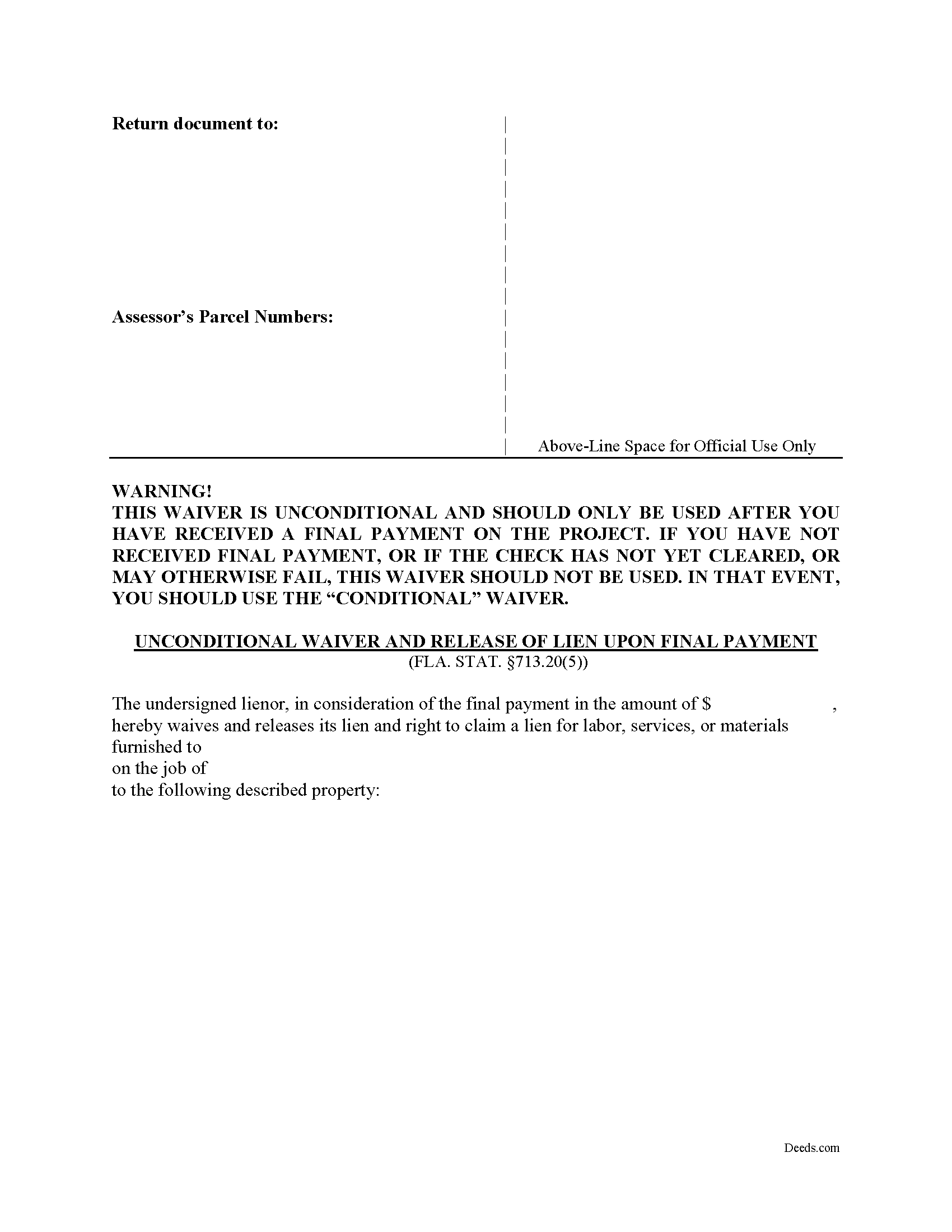
Florida recognizes four types of lien waivers, as set forth in FLA. STAT. 713.20. There are two categories of waivers: conditional and unconditional. Both categories include full or partial releases. A full lien release waives the entire lien amount while a partial waiver relinquishes the right to a lien for the amount represented by a progress payment.
Lienors use the unconditional waiver upon final payment to confirm receipt of the final balance due, and to remove the lien against the property. The waiver must include the names of the lienor, the contractor, and the property owner, the legal description of the property where the work or improvement took place, and the amount paid.
The lienor signs and dates the form in front of a notary, then files it in the records of the same county where the original lien was recorded.
Each case is unique, so contact an attorney with questions about the Unconditional Waiver upon Final Payment or anything else related to Florida's Construction Lien Law.... More Information about the Florida Unconditional Waiver upon Final Payment
Conditional Waiver and Release of Lien upon Final Payment
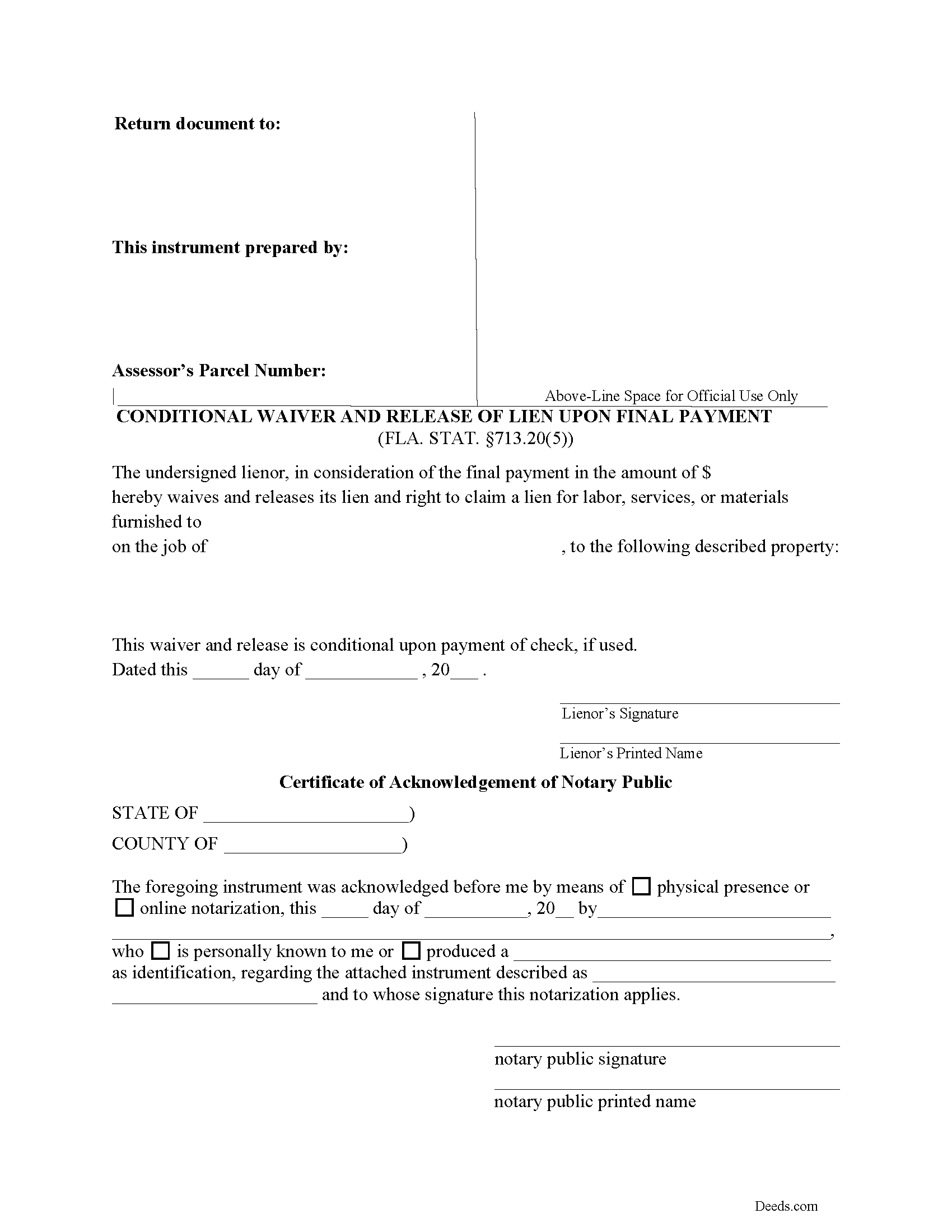
Lien waivers or releases are used to surrender the right to a lien, either in full or in part depending on the type of lien release form selected. Florida's Construction Lien Law authorizes statutory waivers at 713.20 Fla. Stat. (2016).
Under 713.20(5), lienors may waive, on condition of payment, a lien they already filed against the owner's interest in the improved property. The release contains information about the lienor, the customer, the property owner, the property description, the payment amount, and a date to finalize the work covered by the waiver.
Each case is unique, so contact an attorney with specific questions on lien waivers or any other issues related to Florida Construction Liens.... More Information about the Florida Conditional Waiver and Release of Lien upon Final Payment
Request for a Sworn Statement of Account
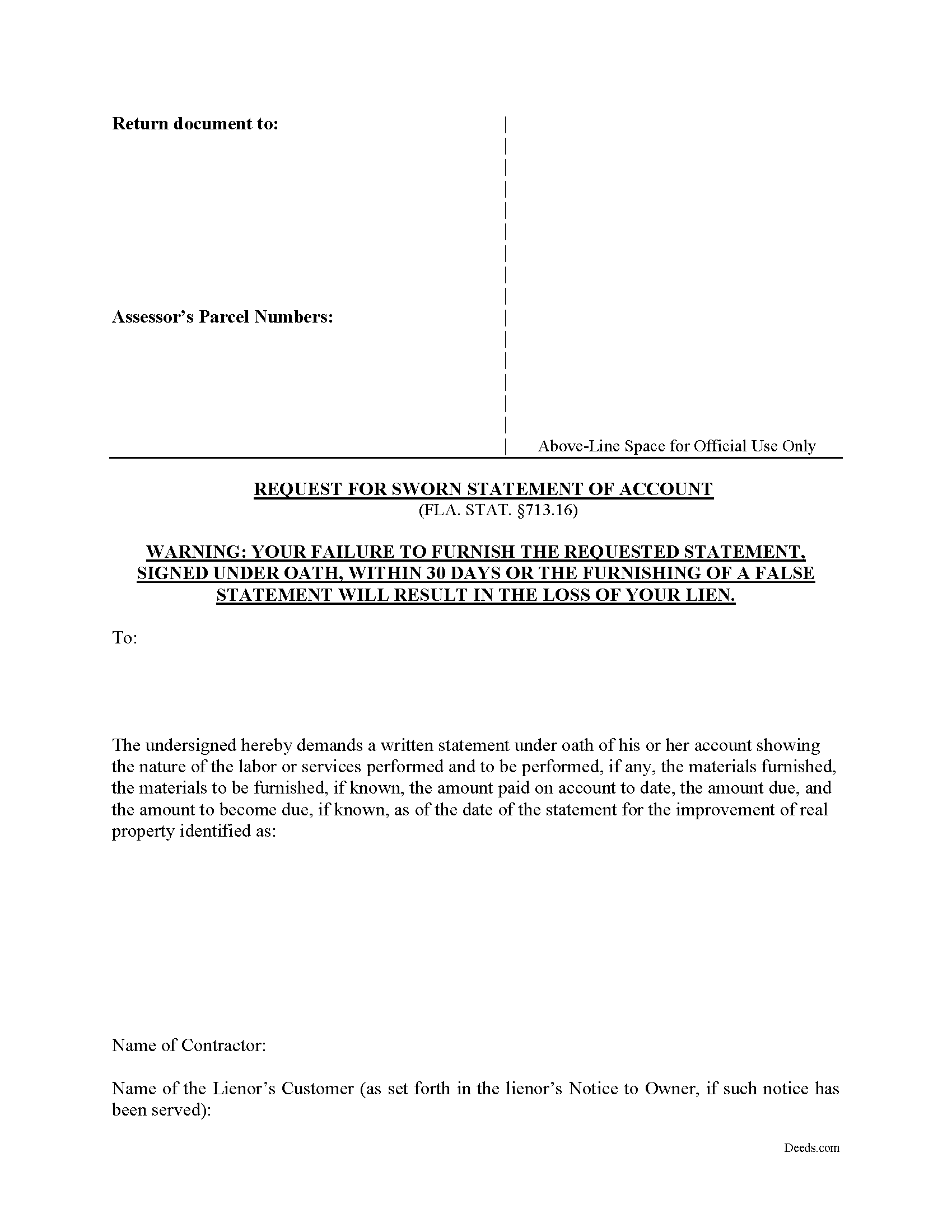
What is a request for a sworn statement of account?
Under section 713.16 Fla. Stat. (2016), a statutory Request for a Sworn Statement of Account is used by property owners in response to a notice of intent to place a lien on the owner's property.
The request is addressed to the lienor and contains a description of the owner's property, the name of the contractor, and the name of the lienor's customer (if different from the owner). The form is then signed and dated by the owner. The demand to the lienor must be served on the lienor at the address (and to the attention) of any person designated to receive the demand as stated in the notice to owner. Failure or refusal to provide the statement as directed will not deprive the lienor of his or her lien. (713.16(2)).
A response to the form from the contractor must include a written statement, given under oath, of his or her account showing the nature of the labor or services performed and to be performed, if any, the materials furnished, the materials to be furnished, if known, the amount paid on account to date, the amount due, and the amount to become due, if known, as of the date of the statement for the improvement of the ... More Information about the Florida Request for a Sworn Statement of Account
Notice of Lien Prohibition
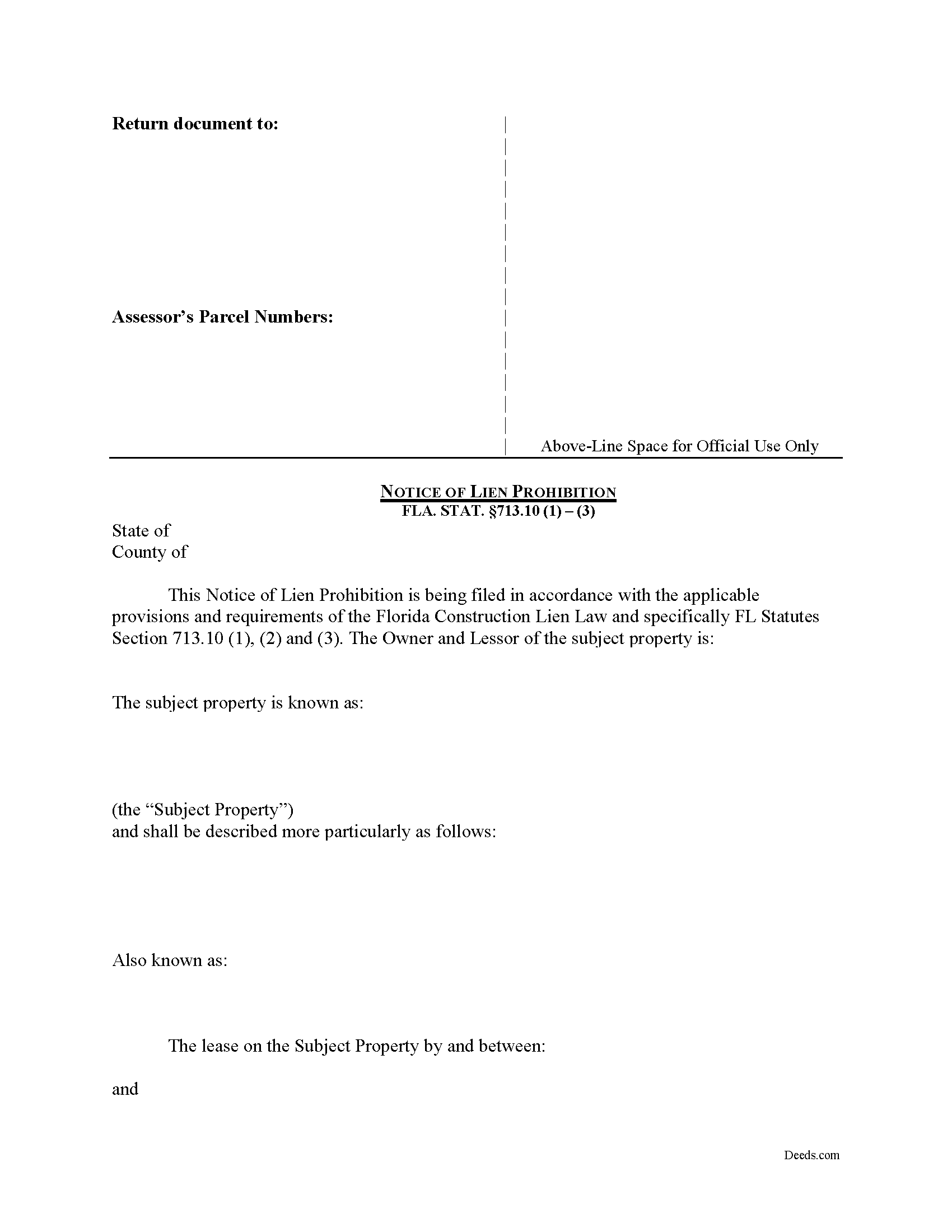
Prohibiting Mechanic's Liens on Leased Property
As a landlord, it's important to ensure tenants don't incur any encumbrance on your property. Tenants might engage a contractor in labor or delivery of materials that can result in a lien placed on your real estate. A notice of lien prohibition puts any potential claimant on notice that the tenant is prohibited from subjecting the property to a lien.
Under state law, a lien shall extend to, and only to, the right, title, and interest of the person who contracts for the improvement as such right, title, and interest exists at the commencement of the improvement or is thereafter acquired in the real property. FLA. STAT. 713.10(1). When an improvement is made by a lessee in accordance with an agreement between such lessee and her or his lessor, the lien shall extend also to the interest of such lessor. Id.
When the lease expressly provides that the interest of the lessor shall not be subject to liens for improvements made by the lessee, the lessee shall notify the contractor making any such improvements of such provision or provisions in the lease, and the knowing or willful failure of the lessee to provide such notice to the co... More Information about the Florida Notice of Lien Prohibition
Lis Pendens
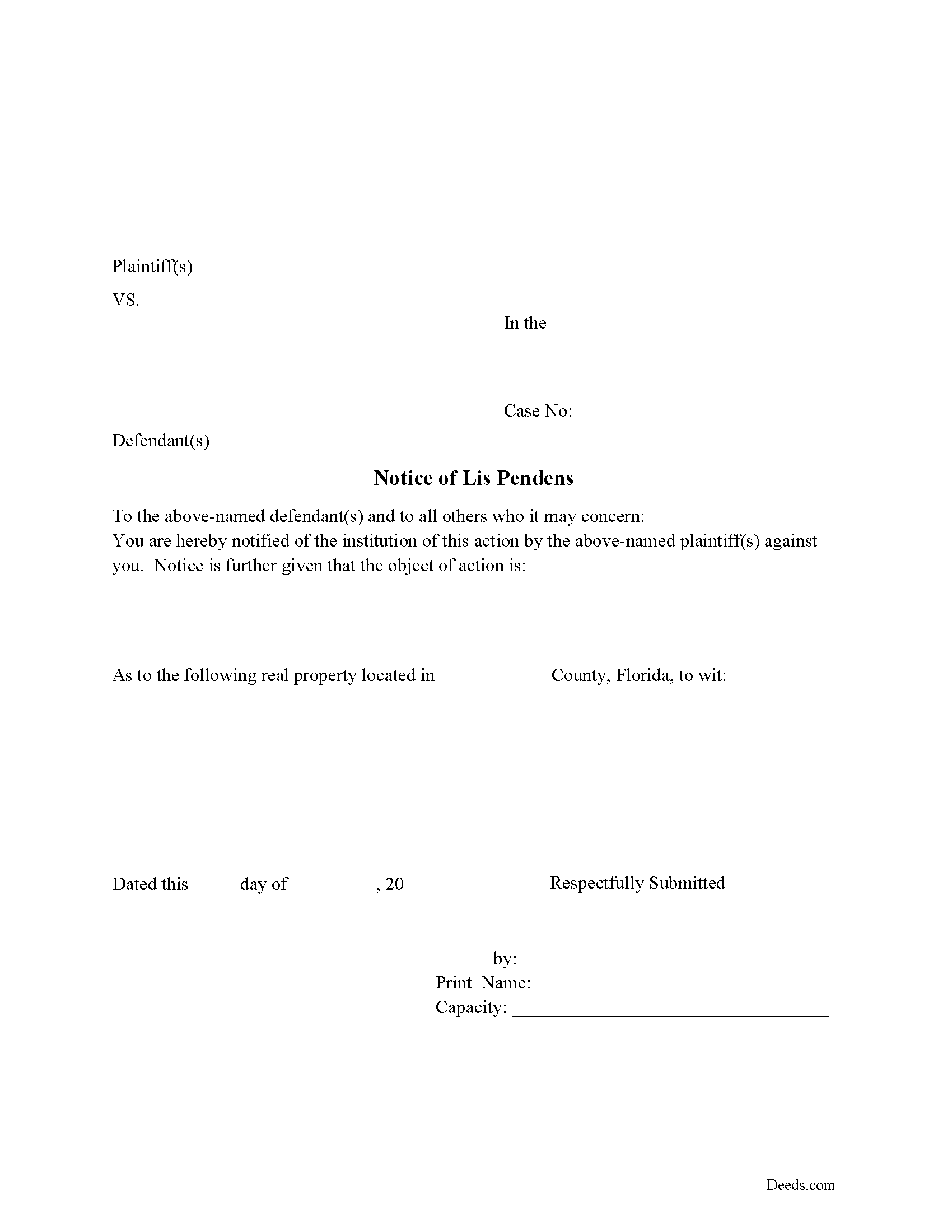
In Florida, for a Lis Pendens to be effective it must be recorded in the county recorder's office, (where the property is located) 48.23 (1)(a).
A Florida notice of lis pendens must contain the following:
a.(The names of the parties.)
b.(The date of the institution of the action, the date of the clerk's electronic receipt, or the case number of the action.)
c.(The name of the court in which it is pending.)
d.(A description of the property involved or to be affected.)
e.(A statement of the relief sought as to the property.) 48.23 (c)1.
A Florida Lis Pendens stays if effect for one year in general. (The court may impose such terms for the extension of time as justice requires.) 48.23(2)
A Lis Pendens is usually filed by the plaintiff ( party initiating suit).
In general, every document filed in a Florida (court proceeding) (must be served) (on each party.) 2.516(a)
(Florida Lis Pendens Package includes form, guidelines, and completed example)... More Information about the Florida Lis Pendens
Release of Lis Pendens
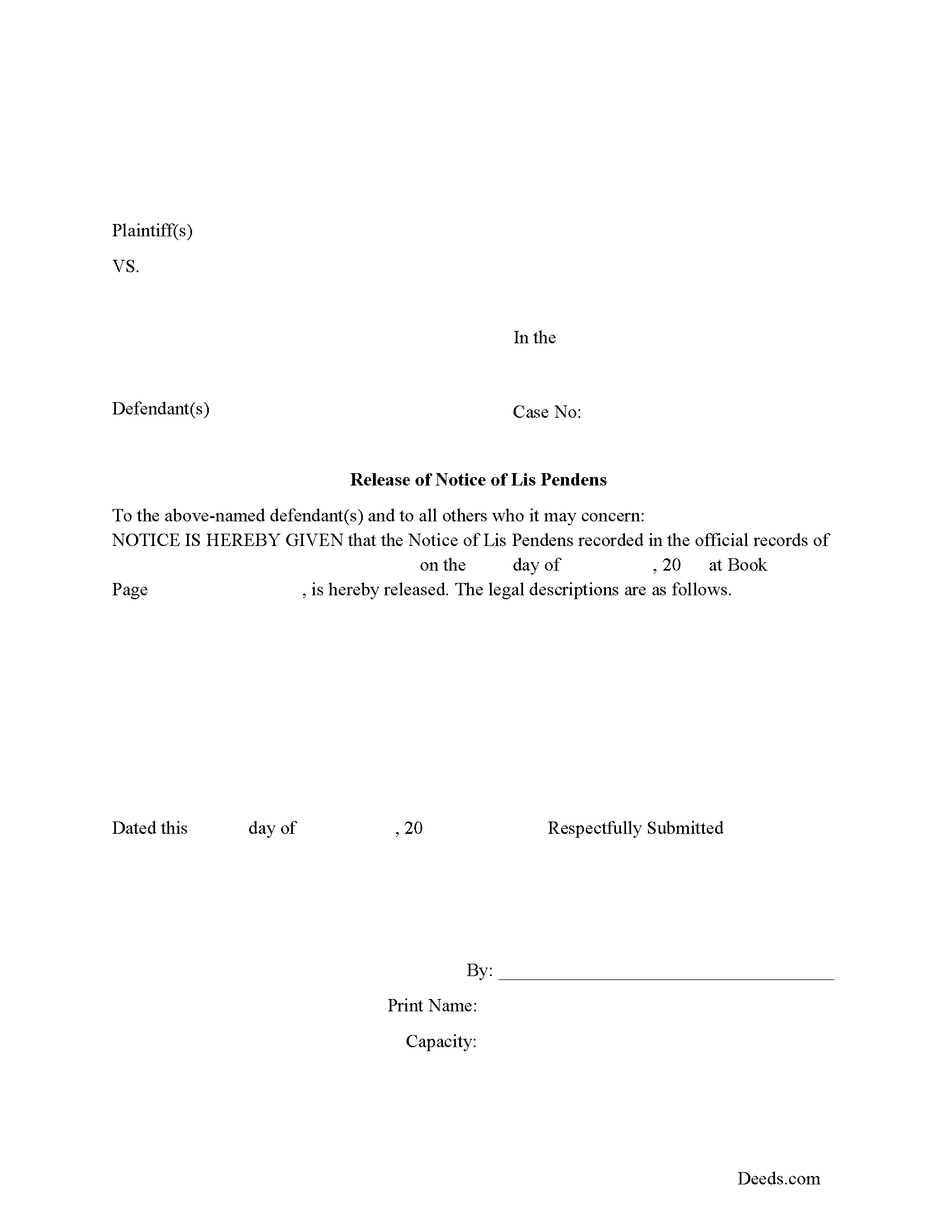
A lis pendens in Florida generally stays in effect for one year, unless withdrawn or discharged. There are situations where the plaintiff (party initiating suit) releases a lis pendens by filing a Release of Lis Pendens. An example would be the case has been resolved, or dropped. Timely filing and service of release can be crucial.
(Florida Release of Lis Pendens Package includes form, guidelines, and completed example)... More Information about the Florida Release of Lis Pendens